Countdown to the U.S. Midterm Election
November 3, 2026
Sunday, January 3, 2027 12 O'Clock High
Democrats take the majority in the US House of Representatives and begin the arduous task of reversing Trump's flagrant follies, cruel mayhem and spiteful reign of terror
🇺🇸Why we need the change now!🇺🇸
🫵🏽how YOU can take part✊🏼
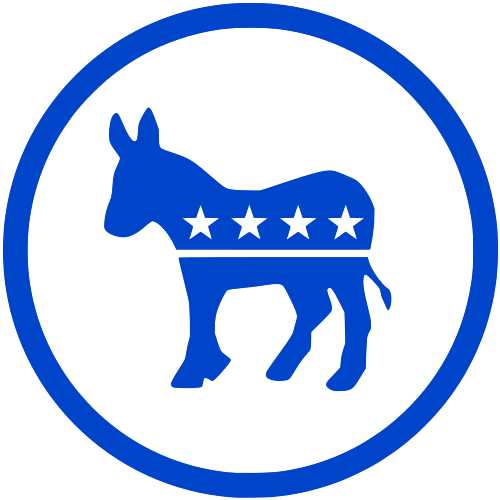
The Democratic Party was long thought of as the party of the working class, minorities and a champion of social justice including women's and LGBTQIA+ rights stemming from the FDR and LBJ presidencies.
The party has failed the working class since the neoliberal modes took over the party with the Clinton-Gore Blue Dog ethos which saw the likes of NAFTA and Welfare "Reform" that targeted single mothers of color.
Read 1 more arguments
Now is the time for the party to hone and prove their position, if indeed, it still holds; or if the disastrous Citizen United decision which has allowed the rich and corporations to contribute enormous financial resources to political campaigns has changed the (former?) Party of the People
- Reneging on "soft defense" funds with USAID that helped stem disease and famine epidemics in a gesture of goodwill from the American people.
- Global upheaval with wrong-headed isolationism just when the world needs to work together most.
- War and strife escalating in Palestine/Gaza/West Bank/and outposts where an ethnic cleansing is in full effect with starvation with food supplies and medical aide being withheld while children and the elderly are passing away in large numbers.
- Ukraine is under a long bombardment siege by a world superpower.
- Famine in Yemen, south Sudan, Kenya with ongoing strife in the DRC, Libya, Mali.
- Economic warfare under the guise of tariffs that are rocking the world economy seemingly by the day.
- Countries are turning away from the US and forging new alliances due to the uncertainty of the grim Trump administration
- At home, minorities, including LGBTQIA+, women rights, minorities, scientists, federal workers and immigrants are all under vehement attack by zealous Trump policies
- The carnage of corruption is destroying the government where essential services are being stripped from those that need it most and being given as a reward to the rich for services rendered
🫏Democrats
Democrats! Find your leader! Support each other! (No more frivolous cancelling.) Take the reins! The carnage must be stopped.
Read 1 more
The *world* is turning to you to put a cog in the wheel of the increasingly irreversible Trump juggernaut of mass destruction.
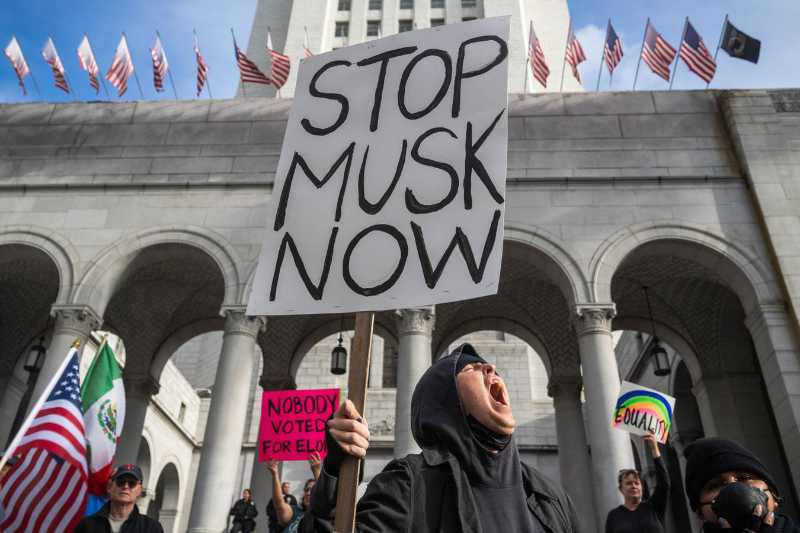
Free Speech and the Right to Protest
Project 2025 and the current Trump administration’s policies pose significant threats to free speech and the right to dissent. These initiatives aim to consolidate executive power, suppress opposing viewpoints, and undermine democratic principles.
- Suppression of Academic Freedom The arrest of Mahmoud Khalil, a Columbia University graduate student known for pro-Palestinian activism, has raised alarms about targeting campus dissent and intimidating international students.
- Media Restrictions Plans to defund public broadcasting entities like NPR and PBS, coupled with proposals to revoke noncommercial statuses of certain media outlets, are viewed as efforts to silence critical journalism.
- Expansion of Executive Power Project 2025 outlines strategies to centralize authority within the presidency, potentially bypassing traditional checks and balances, which could lead to the marginalization of dissenting voices
- Targeting of Protesters The administration’s crackdown on student activists and threats to withdraw federal funding from universities perceived as harboring dissent suggest a broader agenda to stifle protest movements.
- Redefinition of Free Speech While promoting an executive order titled “Restoring Freedom of Speech and Ending Federal Censorship,” critics argue that the administration’s actions selectively protect speech aligning with its views while suppressing opposing perspectives.
- International Reputation The addition of the U.S. to the Civicus Monitor Watchlist indicates a perceived decline in civic freedoms, potentially diminishing America’s standing as a global advocate for democracy and free expression.
💪🏽Dissent
Project 2025 and the Trump administration’s current policies represent a concerted effort to erode fundamental freedoms, including free speech and the right to dissent.
Read 1 more
Such measures threaten the core principles of democracy and aim to suppress opposition through expanded executive power and targeted actions against critics.

Forms of resistance, especially within social and political movements, can range from peaceful and symbolic actions to more confrontational methods.
The governing ideology of the far right has become a monstrous, supremacist survivalism. Our task is to build a movement strong enough to stop them. —Naomi Klein
Read 2 more arguments
As some people stand up to power, it becomes contagious.—Ralph Nader
Action is the antidote to despair. —Joan Baez, Rolling Stone, 6.11.25
-
Civil Disobedience
-
The nonviolent refusal to obey laws, demands, or commands of a government or occupying power. It’s often used to highlight injustice and provoke change.
- Sit-ins during the U.S. Civil Rights Movement (e.g., Greensboro lunch counter, 1960)
- Gandhi’s Salt March (1930) against British colonial salt laws
- Rosa Parks refusing to give up her seat on a segregated bus
-
Key traits
- Peaceful
- Open and public
- Willingness to accept legal consequences
-
The nonviolent refusal to obey laws, demands, or commands of a government or occupying power. It’s often used to highlight injustice and provoke change.
-
Symbolic Resistance
This includes actions that express dissent without direct confrontation.- Wearing specific colors or symbols (e.g., black armbands during the Vietnam War)
- Public art, graffiti, or murals
- Silence or walkouts during official events
-
Non-Cooperation
Refusing to participate in systems that are seen as unjust.- Boycotts (e.g., Montgomery Bus Boycott)
- Strikes and labor shutdowns
- Refusing to pay taxes or serve in the military
-
Protest and Demonstration
Peaceful mass gatherings or marches intended to raise awareness or pressure authorities.- The March on Washington (1963)
- Women’s March (2017)
- Climate strikes led by youth movements
- Digital Resistance
Modern movements often use technology and social media to organize, inform, and resist.- Hashtag activism (#MeToo, #BlackLivesMatter)
- Online petitions
- Coordinated email or message campaigns
More Methods of Resistance
✊🏼RESIST!
"We're mad as hell, and we're not going to take it anymore!" was the phrase Howard Beale, the Prophet of the Airwaves, got listeners to shout from their open windows all over the country, indeed the world, in Paddy Cheyevsky's mind-bogglingly prescient 1977 film Network.
Read 2 more
And when so many feel this urgent call in real life, to combat the cavalcade of emergencies narrated above, these are the things we must do:
- React.
- Resist.
- Demonstrate.
- Call Out.
- Attend a Direct Action.
- Talk to Family, Friends, Neighbors.
- Create Your Network to ✊🏼RESIST!
My friends, it's time to make a beautiful noise.
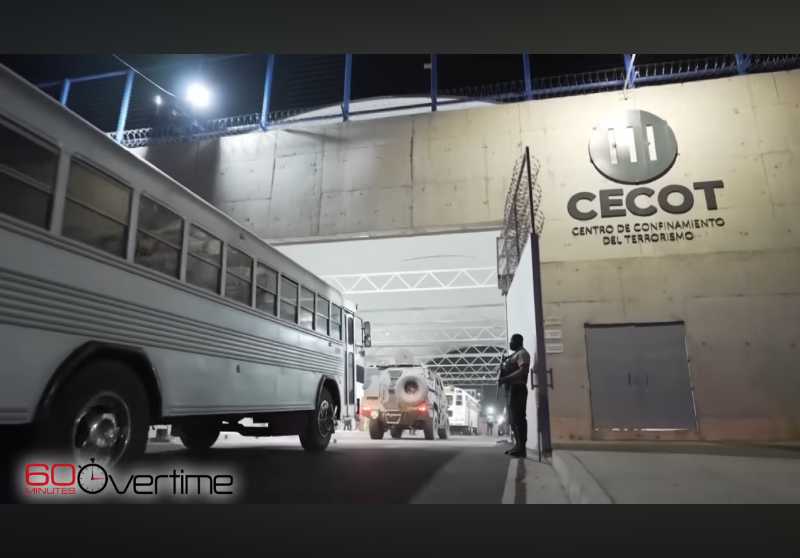
The indescriminant corraling of immigrants with or without documentation, can lead to collapse of entire industries, notably crop harvesting, maintainance, landscaping, building upkeep, construction, and many others.
Is the idea to remove the immigrants and then force those receiving benefits such as Veterans, the disabled, the needy and the elderly by removing their promised pensions and social contracts to work in the fields and construction sites, and to clean the buildings immigrants have traditionally helped with?
Immigrants have long come to America to seek opportunity or asylum from countries hit hard with economic insecurity, often due to interference by the United States itself, e.g., Haiti, Guatemala, Honduras and indirectly African countries thrown into chaos by the deposing of Quadaffi that has wreacked lethal havoc on the countinent since, most pronouncedly in Libya and Mali, but trickled throughout the continent.
-
Humanitarian Concerns
- Many undocumented immigrants have deep ties to their communities, including U.S.-born children, homes, and jobs. Deporting them en masse can break up families, causing trauma and hardship.
- Some asylum seekers and refugees who lack documentation could face life-threatening dangers if sent back to their home countries.
-
Economic Impact
- The U.S. economy relies heavily on immigrant labor, particularly in industries like agriculture, construction, and service work. Mass deportations could cause severe labor shortages and disrupt supply chains contributing to recession, deep recession or depression.
- Studies suggest that undocumented workers contribute billions in taxes and Social Security without being eligible for most benefits, meaning their removal could hurt public revenue.
-
Cost of Enforcement
- Large-scale deportations require significant government spending on enforcement, detention, legal proceedings, and transportation. The cost of forcibly removing millions of people could be enormous, diverting funds from other critical needs.
-
Civil Rights & Due Process
- Mass deportations risk racial profiling and civil rights violations, as law enforcement may disproportionately target people based on appearance or accent rather than legal status.
- Rapid deportation processes can bypass due process, leading to wrongful removals, including of legal residents or even U.S. citizens.
-
Historical Precedents & Moral Considerations
- Previous mass deportation efforts, such as “Operation Wetback” in the 1950s, led to human rights abuses and wrongful deportations. Opponents argue that repeating such actions would be both unethical and ineffective.
- The U.S. has historically been a country of immigrants, and mass deportations contradict the values of inclusion and opportunity.
-
Mistakes
- Falling into bureaucratic errors, such as losing status due to paperwork issues or policy changes.
- There have also been cases of legal residents and even U.S. citizens being mistakenly detained or deported due to flawed databases or administrative mistakes.
⛓️💥Immigration
Comprehensive immigration reform, including pathways to legal status, is a more humane, fiscally responsible and practical solution.
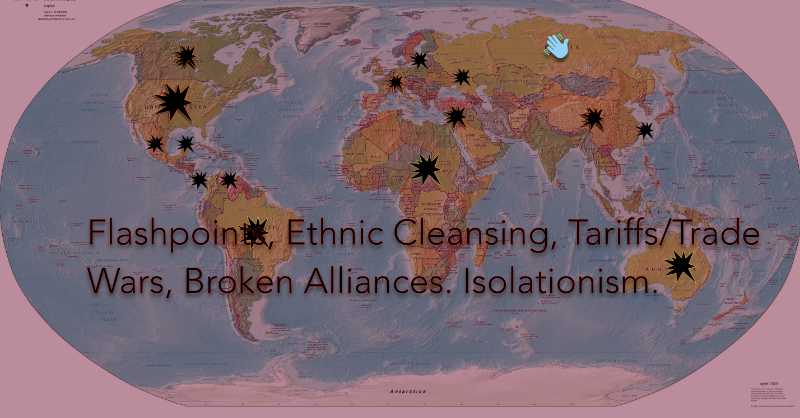
Donald Trump’s return to the international stage has thrown the global order into disarray. His aggressive policies — slapping steep tariffs on allies, unilaterally renaming bodies of water, and pursuing fantastical territorial claims — have left the world’s most stable alliances shaken.
His latest demands, including the confiscation of Greenland and the Panama Canal, have moved from reckless brinkmanship to outright destabilization. Allies, once willing to give the U.S. the benefit of the doubt, are now openly questioning America’s role in maintaining global security and economic stability.
- Gaza: The Riviera Vision In one of his most audacious pronouncements yet, Trump floated a plan to transform Gaza — currently under siege and ravaged by relentless bombing — into a glitzy Riviera-style resort. His suggestion includes relocating Palestinian inhabitants, a move that echoes chilling accusations of ethnic cleansing and has drawn fierce condemnation from human rights organizations around the world.
- Trade Chaos and Tarrif Wars Trump’s imposition of sweeping tariffs on European, Canadian, and Mexican goods has reignited a global trade war. Countries that were once U.S. partners are retaliating with their own tariffs, further straining fragile economies and slowing growth.
- Confiscation Fantasies Demands to seize Greenland and the Panama Canal have been met with widespread condemnation. Denmark, which administers Greenland, has called the notion “absurd and colonial.” Meanwhile, Panama has accused the U.S. of violating international law with Trump’s rhetoric.
- America Trump’s public disdain for NATO allies and his refusal to affirm Article 5 — the mutual defense clause — have led European nations to quietly consider strengthening defense ties without U.S. involvement. Meanwhile, his dismissive treatment of Canada and Mexico has imperiled longstanding regional partnerships.
- Renaming the Gulf of Mexico Unilaterally declaring the body of water the “Gulf of America” has drawn ridicule and fury from Mexico and other Latin American nations. Geopolitical experts warn that this symbolic act further erodes U.S. credibility and fuels anti-American sentiment across the region.
- European Outrage and Realignment With Trump’s isolationist rhetoric and erratic diplomacy, European leaders are pivoting toward greater cooperation with China and other emerging powers, creating a geopolitical shift that could sideline American influence for decades.
🌍Global Upheaval
Donald Trump’s reckless disregard for international norms and diplomacy is pushing America’s closest allies away and emboldening its rivals.
Read 2 more
The economic consequences of trade wars are only the beginning — the geopolitical fallout could fracture alliances that have underpinned global stability since World War II.
The world is watching, and America’s standing as a trusted leader is in free fall.
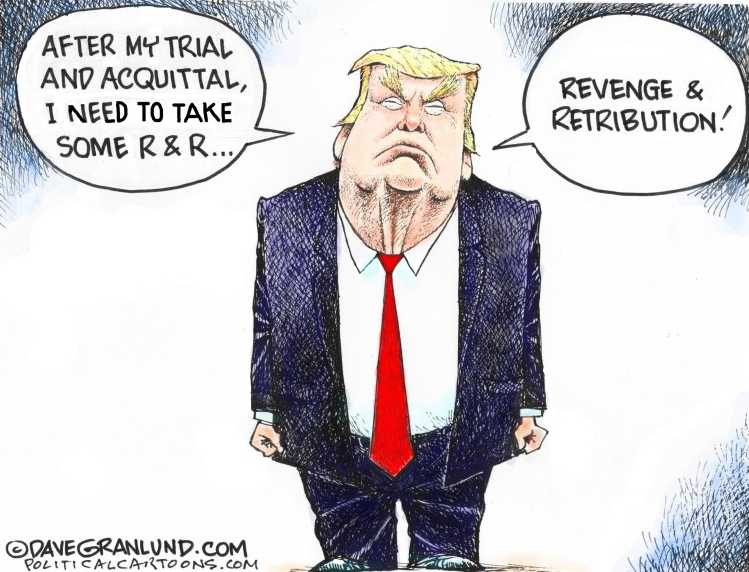
“I am your retribution.” —CPAC, March 2023
“He who saves his Country does not violate any Law” — February 2025
Read 3 more arguments
Donald Trump has returned to the White House like a wrecking ball with a vengeance—erratic, vengeful, and seemingly intoxicated by unchecked power. In just his first few months back in office, global markets have convulsed under the weight of his impulsive tariff announcements—often reversed within hours—raising fears of deliberate market manipulation. ICE raids have escalated into indiscriminate sweeps, pulling innocent people off the streets in a show of force that plays well on TV but reeks of authoritarian excess.
Trump has slashed through the federal government like it’s a personal enemy—firing public servants, closing agencies, and gutting oversight. Internationally, he’s alienating allies like Canada, the EU, and Australia with insults and ultimatums, while musing about taking control of foreign territory in Greenland and the Panama Canal because, in his words, “we have to have it.” This isn’t leadership—it’s chaos with a gold-plated name tag.
In his return to power, Donald Trump has governed by impulse and spectacle. His decisions—often announced via social media or rallies—lack strategic foresight and reveal a deeper crisis of leadership. Nowhere is this more evident than in his erratic economic policies, particularly his on-again, off-again tariffs that send markets swinging wildly and create uncertainty across the globe.
-
Tariff whiplash
- Trump has repeatedly imposed and withdrawn tariffs with little warning or explanation, affecting more than 180 countries. The result? Economic instability, shaken investor confidence, and rising costs for American families.
-
Crisis of leadership
- The administration has dismissed traditional policy channels in favor of headline-driven edicts, undermining trust within U.S. agencies and among global allies.
-
Possible market manipulation
- The president’s timing—paired with well-timed comments from allies—suggests a troubling pattern of using market swings for personal or political gain.
-
Attacks on democratic institutions
- From DOJ interference to rhetoric against the press and judiciary, Trump’s first months have reignited fears of authoritarian drift.
-
Foreign policy as branding exercise
- Whether threatening NATO withdrawal or demanding Greenland, Trump continues to treat international relations as a series of aggressive transactions rather than a coherent strategy.
-
Erosion of Democratic Norms
- Authoritarian Tendencies Trump’s attempts to control the media, law enforcement, and the judiciary have raised alarms about a shift towards authoritarianism.
- Undermining Institutions Actions such as proposing to jail media critics and delivering controversial speeches at the Justice Department have been perceived as threats to democratic checks and balances.
-
Economic Instability
- Trade Policies The implementation of substantial tariffs on imports has destabilized the global economic order, potentially undermining confidence in the U.S. dollar.
- Fiscal Concerns Moody’s has warned that Trump’s policies, including tariffs and tax cuts, could harm the country’s fiscal strength amidst increasing debt and interest rates.
-
Social and Cultural Divisions
- Attacks on Diversity Initiatives Labeling Diversity, Equity, and Inclusion (DEI) efforts as “a tyranny” and vowing to end “wokeness” have been viewed as undermining social progress.
- Public Feuds Long-standing public disputes with figures like Rosie O’Donnell have contributed to a culture of division and distraction from substantive policy discussions.
-
Human Rights and Immigration
- Dehumanizing Rhetoric Trump’s characterization of undocumented immigrants as “animals” and other derogatory terms has been widely condemned as dehumanizing.
- Controversial Deportations The administration’s use of obscure wartime laws to deport individuals without due process has raised significant legal and ethical concerns.
👎🏼Trump
Donald Trump’s leadership is marked by volatility, spectacle, and self-interest. This style isn’t just chaotic—it’s corrosive to democracy, damaging to America’s global standing, and dangerous for working people at home.
Read 1 more
The Trump administration’s recent actions have elicited widespread concern regarding the potential erosion of democratic principles, economic stability, human rights, and social cohesion. It is imperative to critically assess these developments to safeguard the foundational values of the nation.

Rights and Marriage Equality
Trans persons' rights dissolution across the government including being fired from the military and all departments across the government, enduring State Department removal of sex identification, penal incarceration allowances and bathroom identification as well as person pronoun preference removal have terrified and suppressed and already vulnerable and accosted US citizenry.
Read 1 more arguments
But make no mistake, this is just the start of persecuting all non-white, non-straight members of society. Republican Houses are attacking marriage equality at an alarming rate.
-
Fundamental Human Rights and Equality
- Marriage is considered a basic human right, and denying same-sex couples the ability to marry constitutes discrimination based on sexual orientation. Upholding marriage equality ensures that all individuals receive equal treatment under the law, aligning with principles of justice and fairness.
-
Legal and Economic Stability
- Marriage provides couples with numerous legal protections and benefits, including inheritance rights, tax advantages, and decision-making authority in medical situations. Allowing same-sex couples to marry ensures they have access to these critical safeguards, promoting financial and social stability.
-
Social Acceptance and Mental Health
- Recognizing same-sex marriages fosters social acceptance and reduces stigma against LGBTQ+ individuals. This recognition contributes positively to the mental health and well-being of LGBTQ+ people by affirming their relationships and identities.
-
Strengthening Families and Communities
- Marriage equality supports the formation of stable family units, which are foundational to healthy communities. Same-sex couples often raise children, and legal recognition of their unions provides a supportive environment for child-rearing, benefiting society as a whole.
-
Public Support and Societal Progress
- Public opinion has increasingly favored same-sex marriage over the years, reflecting societal progress toward inclusivity and acceptance. Upholding marriage equality aligns with contemporary values and the democratic principle of respecting the will of the majority.
-
Despite these arguments, recent legislative actions indicate a renewed push to challenge same-sex marriage rights:
- State-Level Legislative Actions: Republican lawmakers in several states have introduced measures aiming to challenge and overturn the federally protected right to same-sex marriage. For instance, in Oklahoma, state senators have proposed bills promoting traditional family structures and seeking to contest the Supreme Court’s 2015 decision in Obergefell v. Hodges. Similarly, Idaho legislators have petitioned the Supreme Court to reverse its ruling on same-sex marriage.
- Project 2025: This initiative, supported by conservative groups, outlines plans that could undermine LGBTQ+ rights, including marriage equality. Advocates warn that such projects pose existential threats to the LGBTQ+ community by attempting to dismantle established protections.
🏳️🌈LGBTQIA+
In light of these developments, proponents of same-sex marriage emphasize the importance of vigilance and advocacy to protect marriage equality.
Read 1 more
Any regression in LGBTQ+ rights not only harms individuals directly affected but also undermines the broader principles of civil rights and social justice putting Democracy itself at stake.
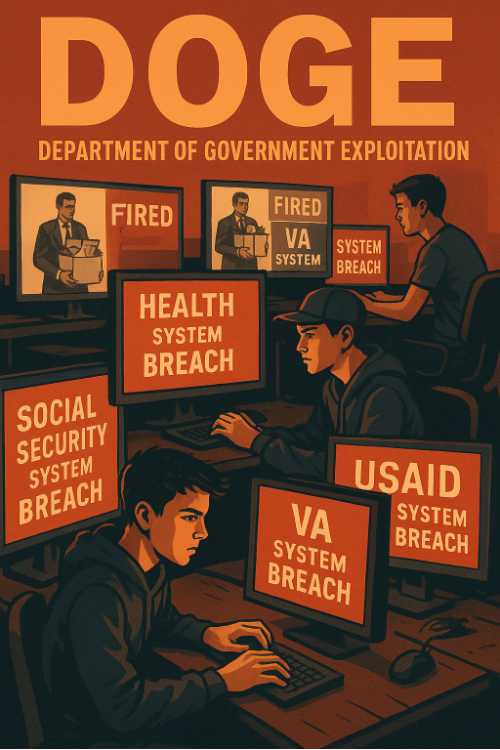
“The fundamental weakness of Western civilization is empathy.”
The Ultra Rich Billionaire may have an ulterior motive for his vast government cut-backs that include favoritism for contracts on pet projects such as the fool's errand to send humans to Mars where he can populate the planet with the progeny of his current 14 children.
Read 1 more arguments
To do that he will need an enormous amount of funding: thus reducing or removing social programs altogether to put all the money toward his impossible dream.
By what Congressional mechanism is this cabinet-level miscreant imposing his will and ways on the totality of the United States: it's goverment, its departments and its people?
-
Potential Erosion of Public Services:
- DOGE’s aggressive cost-cutting measures are leading to the dismantling of essential public services, adversely affecting vulnerable populations who rely on government support.
-
Conflict of Interest:
- Elon Musk’s leadership of DOGE raises concerns about potential conflicts of interest, given his extensive business ventures that may benefit from deregulation and reduced government oversight.
-
Transparency and Accountability:
- The ambiguity surrounding DOGE’s authority and decision-making processes has led to apprehension about the potential for unchecked power and a lack of accountability in implementing significant governmental changes.
-
Labor Rights:
- Reports indicate that DOGE’s initiatives have led to significant job cuts within federal agencies, raising alarms about workers’ rights and the potential weakening of unions.
-
Constitutional Legitimacy:
- The establishment and actions of DOGE have sparked debates about their constitutional validity, with critics arguing that such restructuring efforts should involve legislative oversight to prevent overreach.
These concerns have prompted activists and organizations to protest against DOGE’s initiatives, advocating for the protection of public services, labor rights, and governmental transparency.
🤡Musk/DOGE
Elon Musk is the wealthiest person in the world with a soaring $400,000,000,000 net worth. His achievements are rarely of his own design, but he is clever at buying out ideas that have been run into the ground and resurrecting them, such as PayPal, Tesla, SpaceX and Twitter.
Read 3 more
Due to his high-roller donations to Trump's campaigns and PACs, Musk now wields enormous influence over the president.
Having hollowed out Twitter in a repugnantly smug reign of terror, he aims to do the same to the US Government employees. While taking dollars away from nearly every department and agency in the government, old contracts, contract impediments, and new contracts are being funneled to his companies.
One wonders why, unless it is for his desire to send humans to Mars, an unlikely to succeed endeavor bourne out of watching too many science fiction dramas like Gravity, The Expanse and Dune.

We don’t live in a democracy. Johnson repeatedly emphasizes that the U.S. is a constitutional republic, using this framing to downplay the majority will and justify minority rule.
I am a Bible-believing Christian. Johnson publicly calls himself a “Christian first and foremost” and advocates policies shaped by his personal religious views, often blurring the line between church and state.
Read 5 more arguments
A dark harbinger of chaos and sexual anarchy that could doom even the strongest republic.
On LGBTQ+ rights he has said same-sex marriage is “the dark harbinger of chaos and sexual anarchy that could doom even the strongest republic.”
On abortion, Johnson supports a nationwide abortion ban and has compared abortion rights to the Holocaust.
2020 election: Johnson played a key role in the legal efforts to overturn the 2020 presidential election, rallying House Republicans to support Texas’s failed lawsuit challenging the election results.
- Threat to separation of church and state Johnson uses his office to push Christian nationalist ideals, threatening religious pluralism and secular governance.
- Anti-LGBTQ+ record: He has a long legislative and legal history opposing LGBTQ+ rights, supporting discriminatory policies under the banner of religious freedom.
- Anti-abortion extremism: He backs extreme anti-abortion measures, including federal bans that strip away state-level protections.
- Democracy underminer: Johnson actively worked to overturn a lawful presidential election, undermining U.S. democratic institutions and trust.
- Inexperience and extremism As a relatively junior congressman elevated to Speaker, he lacks deep institutional experience but wields immense power with a rigid, far-right agenda.
- Preserving democracy: Johnson’s alignment with election denialism puts free and fair elections at risk.
- Protecting marginalized communities: His policies directly harm LGBTQ+ Americans, women, and religious minorities.
- Upholding constitutional rights: His Christian nationalist framework threatens the rights of anyone who does not share his religious worldview.
- Resisting authoritarian drift Johnson’s role strengthens the hard-right flank of the GOP, accelerating efforts to impose minority rule through gerrymandering, court-stacking, and voter suppression.
🥶Johnson/House
Mike Johnson is not just another conservative Speaker — he’s a symbol of the growing influence of Christian nationalism and MAGA extremism in U.S. government.
Read 2 more
His leadership amplifies the most dangerous anti-democratic and anti-rights tendencies within the GOP.
We must resist his agenda to defend democracy, equality, and the constitutional separation of church and state.

The U.S. economy is reeling from unpredictable trade policies, whipsawing tariffs, and growing international distrust in American financial instruments. Wall Street is shaken, global investors are pulling out of U.S. Treasuries, and the stock market is oscillating wildly as the White House shifts policy direction by the hour. As confidence erodes, economic analysts warn of an approaching reckoning.
In his return to power, Donald Trump has governed by impulse and spectacle. His decisions—often announced via social media or rallies—lack strategic foresight and reveal a deeper crisis of leadership. Nowhere is this more evident than in his erratic economic policies, particularly his on-again, off-again tariffs that send markets swinging wildly and create uncertainty across the globe.
-
Tariff Chaos
- The President’s on-again, off-again tariff threats have destabilized global trade flows and disrupted supply chains.
-
Market Volatility
- U.S. stock indexes are experiencing historic swings as investors react to the administration’s erratic economic policies.
-
Flight from Treasuries
- Foreign governments and investors are divesting from U.S. debt, undermining long-held trust in America’s fiscal stability.
-
Eroding Confidence
- Economists and news outlets like PBS report growing global concern over whether the U.S. remains a reliable financial leader.
-
Domestic Impact
- Consumers face higher prices while manufacturers and farmers suffer under retaliatory tariffs and uncertain export futures.
-
Mixed Messaging
- Statements from the White House often contradict market expectations, adding confusion to an already fragile economic outlook.
📉Economy
The U.S. economy is entering dangerous territory—not because of external forces, but due to an unstable administration treating global markets like a poker game. Without consistent leadership, even America’s financial backbone is beginning to show cracks.

The Department of Government Efficiency is sifting through $1.6 trillion worth of Social Security payments -- records that include a person's name, birth date and how much they earn -- in an anti-fraud effort that has advocates worried the Trump administration could start denying payments to vulnerable older Americans.
Ultra-conservative perspectives on Social Security often advocate for significant reforms, reflecting concerns about the program’s sustainability and alignment with limited government principles. Key positions include:
Read 1 more arguments
- Raising the Retirement Age Proposals suggest increasing the full retirement age from 67 to 69 over an eight-year period starting in 2026, effectively reducing lifetime benefits for future retirees.
- Benefit Reductions Some plans aim to restore Social Security’s solvency entirely by reducing benefits, focusing on cost-cutting measures rather than increasing revenue.
- Privatization Advocates propose allowing younger workers to opt out of the current system in favor of private retirement accounts, shifting responsibility from the government to individuals.
-
Raising the Retirement Age is a Benefit Cut
- Some right-wing proposals suggest raising the full retirement age from 67 to 69—which effectively cuts benefits since workers would have to wait longer to receive full payouts.
- Not everyone can work longer—this disproportionately harms blue-collar workers, those in physically demanding jobs, and those with health issues.
- Life expectancy is not increasing equally—wealthier Americans live longer, while lower-income workers (especially minorities and rural populations) may not even reach the higher retirement age.
-
Privatization Would Be Risky and Benefit Wall Street, Not Workers
- Some conservatives advocate allowing younger workers to invest part of their Social Security taxes into private accounts instead of the traditional system.
- Stock market volatility could mean huge losses for retirees, especially during economic downturns like the 2008 crash.
- Privatization benefits Wall Street, not retirees, as banks and investment firms would profit from fees while workers take on all the risk.
- Countries that have privatized pensions (like Chile and the UK) saw major failures, forcing governments to step in and restore benefits.
-
Benefit Cuts Would Harm Millions, Especially the Most Vulnerable
- Some right-wing proposals suggest reducing benefits by changing the way cost-of-living adjustments (COLA) are calculated, leading to smaller increases over time.
- Seniors rely heavily on Social Security—for 40% of retirees, it provides 90% or more of their income.
- Cuts would increase poverty, forcing more elderly Americans to work into their 70s or rely on family and social services.
-
Social Security is Not Going Broke—It Can Be Strengthened
- Conservatives often claim that Social Security is running out of money, but progressives argue the system can be fixed by lifting the payroll tax cap.
- Currently, income over $168,600 is not taxed for Social Security—meaning millionaires stop paying after just a few months.
- Lifting the cap (so the wealthy pay the same rate as everyone else) could fully fund Social Security for decades without cutting benefits.
-
Social Security is a Social Contract, Not a Welfare Program
- Right-wing politicians sometimes frame Social Security as an “entitlement” or “handout”, but workers pay into it their entire lives—it’s earned.
- The program keeps over 20 million Americans out of poverty, including disabled workers, widows, and children of deceased parents.
- Weakening Social Security would break America’s promise to workers who paid in and planned their futures around it.
🏦Social Security
Right-wing Social Security reforms prioritize cost-cutting over retirement security, disproportionately harm workers, seniors, and the most vulnerable, and open the door to risky privatization schemes that benefit Wall Street more than retirees.
Read 1 more
Instead of cuts, progressives propose lifting the payroll tax cap, protecting benefits, and expanding Social Security to ensure financial stability for all retirees.

Project 2025 suggests converting federal Medicaid funding into block grants or per capita caps. Currently, the federal government matches state Medicaid expenditures at a fixed percentage; under the proposed changes, states would receive a predetermined federal funding amount regardless of actual costs. This restructuring could lead to reduced coverage and benefits, increasing economic and health insecurity for millions.
Project 2025 proposes substantial cuts to Medicaid funding. These cuts include implementing caps on federal funding, limiting lifetime benefits per person, and allowing states to impose stricter work requirements on beneficiaries. Such measures could result in millions of low-income Americans losing access to essential healthcare services.
Read 4 more arguments
Furthermore, the administration’s recent budget proposal includes an estimated $800 billion reduction in Medicaid funding over the next decade. This proposal has narrowly passed in the Republican-led House, raising concerns about the potential impact on vulnerable populations who rely on Medicaid for healthcare coverage.
In addition to Medicaid cuts, the administration plans to reverse several Affordable Care Act (ACA) provisions. Proposed changes include ending the monthly enrollment opportunity for low-income individuals, shortening the annual open enrollment period by a month, and requiring marketplace enrollees to settle overdue premiums before receiving new coverage. Critics argue that these measures could reduce healthcare access for millions of Americans.
Moreover, the Department of Health and Human Services (HHS) is undergoing significant workforce reductions as part of broader budget cuts. A $25,000 buyout offer has been extended to most of its 80,000 employees, affecting agencies like the Centers for Disease Control and Prevention (CDC), the National Institutes of Health (NIH), and the Food and Drug Administration (FDA). These reductions raise concerns about the government’s capacity to respond to public health crises and maintain essential health programs.
These actions have drawn widespread criticism from healthcare advocates, policy experts, and editorial boards. They argue that the proposed cuts and policy reversals could lead to increased inequality, reduced access to healthcare, and adverse outcomes for the nation’s most vulnerable populations. The debate continues as stakeholders assess the potential long-term impacts of these policy shifts on the American healthcare system.
The Project 2025 proposals for Medicaid focus on restructuring federal funding by introducing block grants or per capita caps, which would limit how much money states receive regardless of actual healthcare costs. Here are the strongest arguments against these proposals:
-
Millions Could Lose Coverage
- Medicaid currently expands automatically when more people need it (e.g., during economic downturns, pandemics, or public health crises). Block grants and per capita caps would set fixed funding limits, making it harder for states to cover everyone in need.
- States facing budget shortfalls would be forced to cut benefits, reduce eligibility, or impose enrollment caps, leading to millions losing access to healthcare.
- Children, seniors, people with disabilities, and low-income families would be hit hardest.
-
Reduced Benefits and Quality of Care
- States relying on fixed federal funds would have to cut services like long-term care, maternity coverage, mental health services, and substance abuse treatment.
- Medicaid recipients could face higher out-of-pocket costs, even though the program is designed for those who cannot afford private insurance.
- Rural hospitals and clinics, which depend on Medicaid funding, could face closures, reducing healthcare access in already underserved areas.
-
Higher Costs for States and Taxpayers
- Currently, Medicaid is a federal-state partnership, where the federal government covers a percentage of costs (ranging from 50% to 90%).
- With block grants, states would receive a fixed amount, forcing them to cover any shortfalls—likely leading to higher state taxes or budget cuts elsewhere (like education or infrastructure).
- Per capita caps would not account for rising healthcare costs (e.g., inflation, new treatments, public health emergencies), leaving states with insufficient funds over time.
-
Worsening Health Outcomes
- Medicaid expansion under the ACA significantly reduced uninsured rates, leading to better health outcomes and lower mortality rates—Project 2025’s proposals could reverse this progress.
- Studies show that reducing Medicaid access leads to increased ER visits, untreated chronic conditions, and higher long-term healthcare costs.
- Cuts to Medicaid for children could impact lifelong health, education outcomes, and economic mobility.
-
Disproportionate Impact on Vulnerable Populations
- People with disabilities could lose access to in-home care, wheelchairs, and essential medical services, forcing them into institutional care or leaving them without support.
- Seniors in nursing homes—over 60% rely on Medicaid—could be forced out due to funding cuts. Where will they go, out on the streets where they unhoused population is already a majority of seniors?
- Low-income working families who rely on Medicaid for preventive care, maternal health, and childcare coverage would struggle to afford private insurance.
-
Inefficiency and Administrative Burden
- Block grants shift financial risk to states, forcing them to spend more on bureaucracy to ration care and determine who gets coverage.
- A capped system discourages innovation—states may avoid investing in preventive care or cost-saving programs because funding is limited.
- Health crises (like COVID-19, opioid addiction, or natural disasters) could quickly overwhelm state budgets, leading to widespread suffering and delayed care.
🚑Medicaid
Project 2025’s Medicaid proposals prioritize cost-cutting over healthcare access, disproportionately harm low-income, elderly, and disabled populations, and could force states into tough budgetary decisions that reduce overall care quality.
Read 1 more
The shift toward block grants or per capita caps does not account for rising healthcare costs, economic downturns, or public health crises, making the system less responsive and less effective at serving those in need.

“I don’t really care what happens to Ukraine one way or another.”
“If I had been vice president, I would have told the states, like Pennsylvania, that violated election laws to go back and fix it.”
“There’s no such thing as a rape exception.”
“Maybe people should have fewer kids if they can’t afford daycare.”
“We’re a country built by immigrants, but we are also a country being invaded by illegal aliens.”
“We need to fire a lot of the teachers and take back the schools.”
“The generals have become nothing more than glorified MSNBC contributors.”
“We have a bunch of childless cat ladies lecturing us about family values.”
“Let’s give power to people who have children, not to childless cat ladies in the government.”
As Vice President of the United States under Donald Trump’s second administration, JD Vance has emerged as a deeply polarizing figure. Once a critic of Trump, Vance’s transformation into one of his most loyal advocates has alarmed many who view his ascent as a dangerous development for democracy, human rights, and environmental protection.
Read 3 more arguments
Vance’s influence in the White House has been marked by aggressive anti-immigration policies, rollbacks of climate protections, and the erosion of reproductive and LGBTQ+ rights. His recent visit to Greenland with his wife has amplified international concerns, drawing harsh criticism for its imperialistic overtones and disregard for indigenous sovereignty.
JD Vance’s vice presidency is emblematic of the extreme direction Trump’s second administration has taken. His influence stretches beyond the traditional role of vice president, positioning him as a key architect of policies that threaten marginalized communities and embolden corporate interests.
Vance’s ideological rigidity and unwavering support for Trump’s authoritarian tendencies have intensified attacks on democratic norms and progressive values. His controversial visit to Greenland, perceived as an extension of Trump’s earlier desire to “buy” the territory, has reinforced concerns about U.S. imperialism and environmental exploitation.
-
Architect of Anti-Immigration Policies
- Vance has been the driving force behind the administration’s harshest immigration policies, including reinstating family separation at the border and implementing mass deportation sweeps.
- He has advocated for terminating birthright citizenship, a move widely criticized as unconstitutional and xenophobic.
- His inflammatory rhetoric, portraying immigrants as existential threats to the nation, has fueled anti-immigrant sentiment and increased violence against marginalized communities.
- Vance has also pushed for the militarization of the southern border, escalating humanitarian crises and further alienating international allies.
-
Rollback of Environmental Protections
- As Vice President, Vance has championed deregulation of environmental protections, undoing decades of progress in combating climate change.
- He has facilitated the expansion of fossil fuel extraction on public lands and dismantled safeguards against pollution, disproportionately harming low-income communities and communities of color.
- Vance’s close ties to the fossil fuel industry have led to accusations of prioritizing corporate profits over the urgent need for sustainable energy policies.
-
Greenland Visit and Neo-Colonial Ambitions
- Vance’s trip to Greenland, accompanied by his wife, was framed as a “strategic exploration” but was widely viewed as an attempt to revive Trump’s earlier scheme to purchase the territory.
- Indigenous leaders and environmental groups condemned the visit, fearing it signals U.S. intent to exploit Greenland’s vast natural resources, including rare earth minerals and untapped oil reserves.
- Critics highlighted the neo-colonial undertones of the trip, accusing Vance of disregarding Greenland’s autonomy and the rights of indigenous communities.
- Environmental activists warned that U.S. involvement in Greenland could accelerate environmental degradation, melting ice caps, and exacerbating climate change.
-
Assault on Reproductive Rights
- Vance has been instrumental in advancing a national abortion ban, even in cases of rape and incest, aligning himself with the most extreme elements of the anti-choice movement.
- His public statements calling for women to “accept the responsibilities of motherhood” have been widely condemned as sexist and regressive.
- Under Vance’s leadership, the administration has also rolled back funding for reproductive healthcare programs, further restricting access for marginalized communities.
-
Hostility Toward LGBTQ+ Rights
- Vance has supported sweeping legislation that curtails LGBTQ+ rights, including bans on gender-affirming care for transgender youth and the rollback of workplace protections.
- His advocacy for “Don’t Say Gay”-style laws has intensified marginalization and discrimination against LGBTQ+ individuals, particularly in education and healthcare settings.
- Vance’s influence has emboldened anti-LGBTQ+ forces, reversing hard-fought gains for equality.
-
Economic Hypocrisy and Corporate Allegiances
- Despite his populist rhetoric, Vance remains deeply tied to venture capital and corporate elites, advancing economic policies that benefit the wealthy at the expense of the working class.
- His push for tax cuts for corporations and the ultra-wealthy has widened income inequality while gutting public services and safety nets.
- Vance’s economic agenda undermines the very communities he claims to represent, leaving behind the rural and working-class populations he once championed in Hillbilly Elegy.
-
Authoritarian Tendencies and Democratic Erosion
- Vance’s alignment with Trump’s authoritarian impulses has facilitated attacks on democratic institutions, including efforts to erode voting rights and undermine judicial independence.
- He has publicly defended Trump’s efforts to consolidate power, including purging government agencies of dissenters and installing loyalists in key positions.
- Vance’s willingness to normalize authoritarian practices has raised alarms about the stability of American democracy.
👺JD Vance
JD Vance’s vice presidency represents a clear and present danger to progressive values, democratic norms, and global stability. His ideological extremism, coupled with his imperial ambitions in Greenland, has drawn sharp criticism from human rights organizations, environmental advocates, and indigenous leaders.
Read 1 more
Vance's influence over Trump’s administration has accelerated the rollback of hard-won rights while deepening social and economic inequities. As Vance continues to entrench himself as a power broker in Washington, progressives must remain vigilant, resisting his agenda with an unwavering commitment to equity, justice, and environmental sustainability.

“We need to ensure that America remains America by preserving its culture and traditions.” — often used as a coded rejection of multiculturalism and immigration reform.
Opposes the DREAM Act and supports restrictive immigration policies despite previously co-sponsoring comprehensive reform.
Read 7 more arguments
Repeatedly called for ending birthright citizenship.
Opposes normalizing relations with Cuba and limits cultural/academic exchanges.
Voted against expanding student visas and easing immigration for high-skilled STEM workers.
Voted for Trump’s Muslim ban and border wall funding.
Supported extreme vetting of foreign travelers and students.
- Anti-Immigration Rhetoric: Rubio plays both sides — publicly softening his tone while consistently voting against policies that enable the flow of diverse ideas, talent, and culture. His policies directly threaten academic, scientific, and artistic exchange.
- Cultural Nationalism in a Suit: He avoids openly xenophobic language but echoes hardline nationalist themes. Rubio’s version of “preserving culture” implicitly rejects global diversity and openness.
- Hypocrisy on Education & Innovation: He praises American exceptionalism and innovation while voting to block the very global talent pipeline that drives U.S. scientific leadership and technological progress.
- Closed Borders = Closed Minds: Rubio supports travel restrictions that choke off cultural diplomacy and peaceful exchange, from artists and students to global business and science communities.
- Latino Tokenism: As a Cuban-American, Rubio’s platform often gets used to shield right-wing agendas from accusations of racism — even as he pushes policies that harm Latinx and immigrant communities.
He has pledged “retribution” against Trump’s perceived enemies and signaled plans to “prosecute” members of the press and government officials who opposed Trump. His alignment with the authoritarian goals of Project 2025 and willingness to politicize the Justice Department make him a dangerous figure in any effort to dismantle democratic institutions.
- Expose His Voting Record: Call out the contradiction between Rubio’s immigrant background and his consistent votes against policies that would help other aspiring immigrants and cultural contributors.
- Defend Openness: Advocate for academic freedom, visa reform, and international exchange as engines of American success — not threats.
- Challenge the Nationalist Narrative: Reclaim “American culture” as one shaped by diversity, inclusion, and global collaboration, not nostalgic isolationism.
- Mobilize Youth & Immigrants: Empower students, foreign-born workers, and cultural organizations to speak out and vote against Rubio’s backward-looking agenda.
🤪Rubio/State
Marco Rubio packages restrictionism in polished rhetoric, but his policies align with the hard-right movement to close America’s doors — to people, ideas, and progress. He’s a danger not because he shouts, but because he smiles while quietly helping dismantle the bridges that make America strong.

We are not trying to rebuild Yemen, we are trying to reset the battlefield
Said Secretary of Defense, "Pete" Hegseth, defending Saudi-led airstrikes that killed civilians, including children.
Read 2 more arguments
During his tenure, Pete Hegseth has been more interested in culture war commentary on Fox News than in managing defense priorities. A scandal-plagued figure, Hegseth has repeatedly supported aggressive military action without clear legal or strategic foundations.
His close alignment with far-right ideologues and disregard for military accountability standards makes his return to any defense post under a second Trump administration not just troubling — but dangerous.
- Supports expanding U.S. military interventions with minimal oversight
- Promoted disinformation about veterans and military readiness to serve political agendas
- Reinstated a ban on transgender individuals enlisting in the military, labeling them as “not deployable” due to reliance on medical treatments, and halted gender-affirming medical care for current service members.
- Criticized policies allowing gay individuals to serve openly, describing them as part of a “Marxist agenda” that prioritizes social justice over combat readiness
- Ordered the removal of diversity, equity, and inclusion (DEI) content from Pentagon platforms, including materials recognizing the contributions of women, Black, Latino, and LGBTQ+ service members
- Terminated the “Women, Peace & Security” program, a bipartisan initiative aimed at enhancing women’s roles in conflict resolution, dismissing it as a “woke” distraction despite its origins in the Trump administration
- Previously mishandled VA reform efforts and ethics protocols
- Advocates authoritarian measures under the guise of “military strength”
- Believes in ideological purges within the military chain of command
🥦Hegseth/Defense
Hegseth represents the militarized face of Trump’s authoritarian vision — one that threatens constitutional limits and global stability alike.
Read 1 more
His elevation signals not just a return to endless war, but a war on truth and military integrity itself.

“There’s no vaccine that is safe and effective.”
Robert F. Kennedy, Jr., once a celebrated environmental lawyer, has become a controversial figure as a presidential candidate, particularly from a progressive perspective. His embrace of conspiracy theories, alignment with right-wing platforms, and opposition to mainstream science have eroded trust among many who once supported him.
Read 3 more arguments
Despite his past advocacy, Kennedy’s focus has shifted away from environmental issues, and he has allied with groups hostile to climate action.
Kennedy suggested the attack on the Capitol may have been “instigated” by government agents, paralleling extremist narratives.
On COVID-19 mandates: “This is the worst attack on civil rights in this country in a generation.” —Comparing public health measures to Jim Crow laws.
- RFK Jr.’s candidacy siphons votes from progressive movements while reinforcing right-wing conspiracy ecosystems.
- His rejection of scientific consensus threatens public health infrastructure.
- His platform provides legitimacy to extremist voices by amplifying their narratives.
- He undercuts civil rights frameworks by misappropriating their language for anti-vaccine rhetoric.
- His campaign distracts from urgent climate action by focusing on grievances over solutions.
- His growing support base includes right-wing operatives looking to fracture progressive coalitions.
🐍RFK/HHS
Robert F. Kennedy, Jr. markets himself as a truth-teller challenging elites—but his campaign advances disinformation, undermines science, and risks enabling authoritarian and anti-democratic forces.
Read 1 more
We cannot afford to normalize or underestimate the threat posed by his position in the Cabinet of the US President.

We need to defend the president at all costs.
There is no evidence of wrongdoing—only a political witch hunt.
Read 5 more arguments
We won’t be pursuing legal action against Trump University.
(Bondi’s office’s position after a $25,000 donation from Trump’s foundation in 2013)
We’re prioritizing law and order, not social experiments.
(In defense of policing tactics and opposing federal police reform, 2023)
- She’s blocking efforts at police reform and accountability. Bondi’s DOJ has actively intervened to dismantle consent decrees and oversight in cities with histories of police brutality, emboldening violent and discriminatory practices.
- She’s silencing dissent and targeting political enemies. Under her leadership, the DOJ has prioritized investigations into protest movements (Black Lives Matter, immigrant rights advocates) while ignoring violent white nationalist groups.
- She’s enabling corporate polluters and undermining environmental protections. Bondi joined lawsuits against the EPA’s climate rules and has defended deregulation efforts that benefit big polluters at the expense of public health and marginalized communities.
- She’s complicit in the rollback of reproductive rights. Bondi’s DOJ has defended state-level abortion bans, supported restrictive Title X changes, and sought to limit access to abortion pills — threatening reproductive freedom nationwide.
- She’s furthering a dangerous authoritarian agenda. By prioritizing loyalty over legality, attacking independent investigators, and undermining checks on presidential power, Bondi is advancing a vision of government where laws protect the powerful, not the people.
- Bondi is weaponizing the Justice Department for Trump’s personal and political vendettas. Bondi has a history of putting loyalty to Trump over the rule of law, from covering for fraudulent business practices to defending unconstitutional executive actions.
- She’s undermining civil rights and voting rights. Her record shows opposition to ballot access expansion, support for voter roll purges, and hostility toward voting rights litigation — putting the votes of Black, Latino, and young Americans at risk.
- She’s blocking efforts at police reform and accountability. Bondi’s DOJ has actively intervened to dismantle consent decrees and oversight in cities with histories of police brutality, emboldening violent and discriminatory practices.
- She’s silencing dissent and targeting political enemies. Under her leadership, the DOJ has prioritized investigations into protest movements (Black Lives Matter, immigrant rights advocates) while ignoring violent white nationalist groups.
- She’s enabling corporate polluters and undermining environmental protections. Bondi joined lawsuits against the EPA’s climate rules and has defended deregulation efforts that benefit big polluters at the expense of public health and marginalized communities.
- She’s complicit in the rollback of reproductive rights. Bondi’s DOJ has defended state-level abortion bans, supported restrictive Title X changes, and sought to limit access to abortion pills — threatening reproductive freedom nationwide.
- She’s furthering a dangerous authoritarian agenda. By prioritizing loyalty over legality, attacking independent investigators, and undermining checks on presidential power, Bondi is advancing a vision of government where laws protect the powerful, not the people.
Read 1 more
😱Bondi / DOJ
Organize at the local and state level to protect voting rights.

We’re going to come after the people in the media
We will prosecute [journalists and DOJ officials] for crimes they committed
The next Trump administration will have a better plan to take over
Kash Patel is one of the most loyal and aggressive Trump allies positioning himself for a powerful role in a second Trump administration, reportedly on the shortlist for Attorney General or other key posts in charge of prosecutions.
Read 2 more arguments
Praised the Immigration Act of 1924 (a law designed to keep nonwhites and Jews out of the U.S.) as a model.
Sent white nationalist literature, including "The Camp of the Saints," to reporters and colleagues as policy inspiration.
Opposed accepting Afghan refugees after U.S. withdrawal: “We don’t know who they are.”
- Patel’s stated plans to weaponize the Justice Department against journalists, political rivals, and civil servants would violate the First Amendment and the principle of independent justice.
- His role in efforts to overturn the 2020 election, including pushing false intelligence claims, shows a record of undermining democratic processes.
- Installing loyalists like Patel in prosecutorial roles would effectively erase checks and balances designed to prevent presidential abuse of power.
- His participation in smear campaigns against intelligence and law enforcement officials threatens national security by politicizing critical agencies.
🤠Patel/FBI
Kash Patel isn’t just another partisan fighter—he represents the operational muscle behind Trump’s plans for revenge governance. His potential appointment to the Justice Department could weaponize the law itself, targeting political enemies and dismantling independent oversight.
Read 1 more
Fighting Patel’s elevation is fighting for the survival of democratic accountability.

I would be happy if not a single refugee foot ever again touched America’s soil.
[birthright citizenship] cheapens American citizenship.
Stephen Miller, long-time Trump policy advisor and now deputy chief of staff poised for a national security role, represents a dangerous consolidation of authoritarian, exclusionary, and ethnonationalist ideology within U.S. government leadership.
Read 4 more arguments
Miller has been the architect of some of the most draconian immigration policies in modern U.S. history, including the Muslim travel ban, family separations at the border, and severe refugee admissions cuts.
His policy recommendations are rooted in a documented history of white nationalist sympathies and anti-immigrant extremism, creating a direct pipeline from fringe racist ideologies to federal policy.
Miller’s elevation to a national security position signals a broader agenda of weaponizing immigration enforcement, eroding civil liberties under the guise of security, and hardening America’s posture toward nonwhite nations and peoples.
His record demonstrates not only indifference but hostility toward pluralism, inclusion, and basic human rights.
- Stephen Miller is a committed ideologue, not just a bureaucrat. His policies have consistently aimed to reshape the demographics of the U.S., as reflected in his extensive private communications with white nationalist figures (revealed in leaked emails published by the Southern Poverty Law Center).
- His influence will grow exponentially in a national security role. This position would grant him increased authority over surveillance, asylum, refugee policy, and domestic security, expanding his reach from immigration enforcement into broader civil liberties.
- He has already normalized cruelty. From justifying family separations to slashing legal immigration, Miller has shown a willingness to inflict suffering on vulnerable populations for ideological goals.
- He represents an ongoing white nationalist project. Miller’s writings and leaked communications reveal admiration for figures like Calvin Coolidge for immigration restrictions and endorsements of the white genocide conspiracy theory-adjacent narratives.
If confirmed or allowed to assume this role without resistance, Miller will institutionalize racism and authoritarian measures more deeply into U.S. governance—posing risks not only to immigrants but to dissenters, communities of color, and democratic norms.
🥸Miller/Policy
Stephen Miller’s elevation is not merely a personnel shift—it’s a profound threat to multiracial democracy, civil rights, and human dignity.
Read 2 more
His worldview is explicitly shaped by white nationalist thought, and his policies have already harmed millions.
Allowing him to expand his power into national security invites an era of greater surveillance, repression, and exclusion based on race and religion. We must fight his appointment, expose his ideology, and mobilize public and institutional opposition before irreversible damage is done.

This president speaks for God’s will in a time of national crisis.
Our job is not to question but to carry the message forward
There is no room in this White House for media that aim to undermine America.
The enemy is not outside the gates—it’s inside your newsfeed.
Karoline Leavitt is not just a press secretary. She is the chief propagandist of a new era of White House communications that blurs the line between press briefings and indoctrination. Her briefings increasingly resemble religious revivals or authoritarian performance art: choreographed, unwavering in praise for Trump, and hostile toward any journalist who asks tough questions.
Read 2 more arguments
Leavitt’s style has signaled a full collapse of traditional press independence in the executive branch. Rather than informing the public, her press office distributes ideological loyalty tests. Mainstream reporters are excluded, while right-wing influencers and pro-Trump vloggers are given front-row seats and insider access.
She presents herself as a devout Christian and defender of “traditional values,” but her actual role is laundering authoritarianism in a soft, polished tone. With threats to revoke credentials, blacklists of reporters, and coordinated attacks on “enemy media”, the office of the Press Secretary has become a weapon against democracy itself.
- Dismantling press freedom Leavitt’s hostile stance toward independent media undermines the First Amendment.
- Spreading religious nationalism Her messaging fuses Trump loyalty with divine authority, feeding a theocratic political movement.
- Elevating propaganda over truth She promotes misinformation and suppresses legitimate journalism.
- Censoring dissent Barring outlets like NPR and PBS is a warning sign of escalating autocracy.
- Chilling effect on reporters Journalists face retaliation for asking basic questions—an attack on accountability itself.
🗣Leavitt/PR
Karoline Leavitt is not just the face of Trump’s White House, she is the mouthpiece of a cult-like administration that no longer pretends to respect a free press. Under her, the press briefing room has become a performance stage for authoritarian loyalty.
Read 1 more
Every time she steps to the podium, it’s a reminder that truth is being replaced with obedience. This isn’t just spin—it’s a deliberate, dangerous erosion of democratic norms, and it must be called out for what it is: propaganda in real time.

“We’re going to keep our state safe — that means saying no to refugees who may bring problems with them.” (2021)
Promoted the false claim that immigrants are bringing crime and fentanyl across the border “by the ton.”
Criticized international student programs and cultural exchange as potential “security vulnerabilities.”
Read 8 more arguments
Supported Texas efforts to defy federal immigration law and militarize the southern border.
Endorsed Trump’s Remain in Mexico and family separation policies.
Supported banning sanctuary cities and expanding ICE enforcement powers.
Fear-Based Immigration Policy Noem repeatedly frames immigrants as dangerous — conflating refugees, asylum seekers, and students with crime and drugs — a narrative proven false but politically useful.
Undermines Humanitarian Principles Her stance on Afghan and Latin American refugees rejects international obligations and moral leadership. She promotes a fortress mentality, not compassion or cooperation.
Cultural Hostility By targeting global student and exchange programs, she endangers America’s educational prestige and long-standing leadership in scientific and artistic collaboration.
States’ Rights over Human Rights Noem champions state-level defiance of federal immigration protections — a dangerous precedent that erodes national unity and due process.
Demagogues in a Cowboy Hat Her folksy image masks policies that align closely with the most extreme elements of Trump-era immigration enforcement — but with less scrutiny.
- Challenge the “Security” Frame Refute the myth that diversity equals danger. Highlight data: immigrants commit fewer crimes, contribute economically, and enrich American life.
- Expose the Real Cost Show how her anti-immigrant policies damage local economies, especially agriculture, education, and healthcare — all reliant on immigrant labor and expertise.
- Support Refugee Resettlement and International Exchange Protect programs that bring in students, scientists, and artists. Promote visa reforms that uphold American values.
- Hold DHS Accountable DHS must not become a staging ground for nativist ideology. Push for oversight, transparency, and humane immigration policy, especially under Noem’s leadership.
- Mobilize Allies Across Sectors Educators, healthcare workers, farmers, artists, and business leaders must speak out — this is not just a border issue, it’s a national one.
🐕🔫Noem/DHS
Kristi Noem would turn Homeland Security into a political weapon — replacing law and order with fear and division.
Read 2 more
Her hostility to refugees, students, and international collaboration makes her unfit to lead any agency that touches America’s global presence.
Under her, borders don’t just close — so do minds, futures, and lives.

Comey’s post was a clear incitement to assassinate President Trump. He should be imprisoned.
When I look at [Democrats and progressives] who are fomenting this kind of divisiveness and hatred, they are the domestic enemies we swore an oath to protect our country from.
The Democratic Party that I joined doesn’t exist anymore.
Zelensky is no hero.
The intelligence community has been politicized for far too long. It’s time to restore trust and integrity.
Tulsi Gabbard’s trajectory from a Democratic congresswoman to the Director of National Intelligence under President Trump marks a significant ideological shift. Initially known for her anti-interventionist stance and progressive views, Gabbard has repositioned herself as a staunch ally of Trump’s agenda.
Read 2 more arguments
As DNI, Gabbard has undertaken actions that politicize the intelligence community:
- Dismissal of Senior Intelligence Officials Gabbard fired two top officials from the National Intelligence Council after they released a memo contradicting Trump’s claims about Venezuelan immigrants and gang affiliations. This move raised concerns about the suppression of intelligence that doesn’t align with political narratives.
- Restructuring Intelligence Operations She has shifted key operations, including the preparation of the President’s Daily Brief, from the CIA to the Office of the Director of National Intelligence, consolidating control and raising alarms about potential politicization.
- Stance on Surveillance Despite previously opposing certain surveillance measures, Gabbard now supports the reauthorization of Section 702 of the Foreign Intelligence Surveillance Act, a reversal that has drawn criticism from civil liberties groups.
- Public Statements Gabbard’s public condemnation of figures like James Comey, accusing him of inciting violence against Trump, has been labeled as extreme and unfounded by legal analysts.
- Politicization of Intelligence Gabbard’s actions suggest a trend of aligning intelligence assessments with political objectives, undermining the objectivity essential for national security.
- Suppression of Dissent The removal of officials who present analyses contrary to the administration’s narrative threatens the integrity of intelligence operations.
- Erosion of Civil Liberties Her reversal on surveillance policies indicates a willingness to expand government overreach, potentially infringing on individual rights.
- Undermining Democratic Institutions Gabbard’s alignment with authoritarian figures and rhetoric poses a risk to the democratic principles she once championed.
- Anti-LGBTQ+ Record Despite past apologies, Gabbard has spoken at anti-trans and anti-LGBTQ+ events and backed anti-equality candidates.
🐲Gabbard/NSA
Tulsi Gabbard’s transformation from a progressive Democrat to a central figure in Trump’s administration reflects a broader trend of politicizing institutions that are meant to remain impartial.
Read 1 more
Gabbard's tenure as DNI has been marked by actions that prioritize political loyalty over objective analysis, raising concerns about the future of the U.S. intelligence community and its role in safeguarding democracy.

Throughout the Trump administration and under the ausipices of the spurious Department of Government Efficiency lead by non-US employee, non-vetted, non-confirmed appointee Elon Musk, mass layoffs of employees are taking place with often less than a single business day notice.
The mayhem this is causing reaches not only the families of those who are now in despair, but the carnage is dimantling the workings of the government itself in no uncertain terms, leaving citizens stranded and without a safety net, from the FAA that runs the air space to the VA that gives care to our Veterans. Incomprehensibly, the dire situation appears to only be beginning.
-
Disruption of Essential Public Services
- Reducing the federal workforce can lead to diminished public services. The American Federation of Government Employees (AFGE) warns that such layoffs could result in longer waits at Veterans Affairs (VA) hospitals, fewer food safety inspections, reduced medical research, increased air travel risks, and delays in Social Security and passport processing.
-
Legal Challenges and Overreach
- A federal judge ruled that the mass firings of probationary employees were unlawful, stating that the Office of Personnel Management (OPM) exceeded its authority by terminating employees from other agencies. The American Civil Liberties Union (ACLU) also criticized the layoffs, emphasizing that they threaten essential services and undermine the checks and balances provided by civil servants.
-
Economic Impact on Families and Local communities
- Mass layoffs of federal workers can adversely affect families and local economies. Communities with a high concentration of federal employees may experience economic downturns due to reduced consumer spending and increased unemployment.
-
Loss of Institutional Knowledge
- The departure of experienced federal employees results in a significant loss of institutional knowledge, hindering the government’s ability to address complex issues effectively. This gap can lead to inefficiencies and challenges in policy implementation.
-
Potential for Increased Privatization and Automation
- The reduction in federal workforce sets the stage for greater privatization and automation of government services. While this may lead to short-term cost savings, it raises concerns about data security, biases in artificial intelligence systems, and the digital divide, potentially leaving many Americans without access to essential services.
-
Negative Impact on Employee Morale and Public Perception
- The abrupt nature of these layoffs has damaged the federal government’s reputation as a stable employer, leading to decreased morale among remaining employees. This environment may deter talented individuals from pursuing public service careers, affecting the quality of governance in the long term.
⛑️Federal Workers
Mass firings of federal employees and contractors pose risks to public service delivery, legal integrity, economic stability, and the effective functioning of government operations.
Read 1 more
These lawsuits reflect widespread legal challenges to various policies and actions undertaken by the current administration, encompassing issues such as immigration, civil rights, labor practices, and diversity initiatives.

Rights of Transgender People to Exist
If you or your loved ones are part of the LGBTQ community, there are steps you should take to protect yourself.
Read 2 more arguments
Transgender individuals are currently facing significant challenges due to policies and initiatives from both the Trump administration and the conservative-led Project 2025. These measures include:
-
Redefinition of Gender in Federal Policies
The Trump administration issued an executive order mandating that all federal agencies define sex strictly as male or female, based solely on biological attributes at birth. This order effectively nullifies recognition of transgender and nonbinary identities within federal policies, leading to the rollback of existing protections against discrimination in areas such as healthcare, education, and employment.
-
Restrictions on Gender Marker Updates
The administration has halted the process for transgender individuals to update gender markers on passports and other federal identification documents. This abrupt policy change has left many with inaccurate identification, complicating daily activities that require ID verification and increasing vulnerability to discrimination and harassment.
-
Erasure of Gender Identity Data Collection
The U.S. Census Bureau, aligning with the administration’s directives, has sought to remove questions related to gender identity from national surveys. This action impedes the collection of vital data necessary to understand and address the unique challenges faced by transgender individuals, potentially hindering the development of informed policies and allocation of resources.
-
Project 2025’s Anti-Transgender Proposals
Spearheaded by conservative organizations, Project 2025 outlines plans to enforce a binary definition of sex in federal law, effectively denying the existence of transgender identities. The project proposes policies that could criminalize the acknowledgment and support of transgender individuals, equating “transgender ideology” with obscenity and suggesting punitive measures against educators and librarians who provide transgender-inclusive materials.
-
International Criticism of Anti-Transgender Policies
The United Nations human rights chief has expressed deep concern over the U.S. administration’s shift towards policies that undermine anti-discrimination protections, particularly those affecting transgender individuals. These policies contribute to a climate of fear and anxiety among marginalized communities and are viewed as a regression from established human rights standards.
Collectively, these actions represent a concerted effort to marginalize transgender individuals by stripping away legal recognitions and protections, thereby exacerbating social stigmatization and discrimination.
-
Violation of Human Rights and Civil Liberties
- Government Overreach The policies dictate personal identity, limiting individual freedoms and violating the right to self-determination.
- Discrimination Rolling back legal protections denies transgender people equal rights in employment, housing, healthcare, and education, contradicting principles of fairness and equality.
- International Backlash UN and other human rights organizations have condemned these policies as violations of fundamental rights, putting the U.S. at odds with global democratic norms.
-
Constitutional and Legal Challenges
- 14th Amendment – Equal Protection Clause Targeting transgender individuals with restrictive policies denies them equal protection under the law.
- First Amendment Concerns Proposals to criminalize discussions of transgender identities in schools and libraries infringe on free speech and access to information.
- Legal Precedents The Supreme Court’s ruling in Bostock v. Clayton County (2020) affirmed that discrimination based on gender identity is a form of sex discrimination under Title VII, making some of these policies legally dubious.
-
Harm to Public Health and Well-Being
- Mental Health Crisis Studies show that denying transgender people access to affirming healthcare and legal recognition increases rates of depression, anxiety, and suicide.
- Barriers to Medical Care Banning gender-affirming care contradicts recommendations from major medical organizations (e.g., American Medical Association, American Academy of Pediatrics) and prevents doctors from following best practices.
- Increased Violence and Harassment Anti-trans policies fuel stigma and embolden hate groups, leading to higher rates of violence against transgender individuals.
-
Economic and Workforce Consequences
-
Job Discrimination Harms the Economy
Restricting workplace protections for transgender individuals leads to job loss, reduced productivity, and economic instability. - Talent Drain Anti-LGBTQ+ policies make the U.S. a less attractive place for skilled workers, investors, and businesses, particularly in industries that value diversity and inclusion.
- Burden on States States with anti-trans laws often face costly legal battles and lose revenue from tourism, businesses, and conventions boycotting discriminatory policies.
-
Job Discrimination Harms the Economy
-
Threat to Parental Rights and Personal Freedoms
- Government Interference in Families Efforts to ban gender-affirming care for minors contradict conservative principles of parental rights, as they take medical decisions out of the hands of parents and doctors.
- Privacy Violations Laws requiring gender to be based on assigned sex at birth could lead to invasive monitoring, such as forced disclosure of medical history or identity checks.
-
Political and Social Backlash
- Unpopular with the Public Polls show most Americans support protections for transgender people. Extreme policies risk alienating moderate and younger voters.
- Corporate Opposition Major companies, including tech firms, banks, and healthcare providers, have opposed anti-trans policies, warning that they hurt innovation and workplace inclusivity.
- Legal Defeats Many states have already faced court challenges over anti-trans laws, with judges ruling that these policies violate constitutional rights.
🏳️⚧️Trans Rights
These policies are unconstitutional, harmful to public health, damaging to the economy, and inconsistent with conservative values of limited government and individual freedom.
Read 1 more
Such measures create unnecessary legal battles, economic losses, and social division, while ultimately failing to address any real societal concerns.

The 2025 plan advocates for making Medicare Advantage—the privatized arm of Medicare—the default option for all enrollees. This shift aims to increase competition and reduce costs but may limit beneficiaries’ choice of healthcare providers and require prior authorizations for certain services. Additionally, Project 2025 recommends repealing provisions of the Inflation Reduction Act, including caps on insulin prices and out-of-pocket drug costs, potentially increasing expenses for beneficiaries.
The administration’s Medicare Innovation Center plans to cancel six payment trials by the end of the year, aligning with the “Make America Healthy Again” movement. This includes ending trials like Making Care Primary and Primary Care First. The focus is shifting towards models that support Health and Human Services Secretary Robert F. Kennedy Jr.’s public health agenda.
Read 5 more arguments
Additionally, Project 2025 proposes making Medicare Advantage—the privatized arm of Medicare—the default option for all enrollees. Critics argue this could limit healthcare choices for seniors and jeopardize the program’s financial health.
Department of Health and Human Services (HHS)
Significant workforce reductions are planned at HHS under Secretary Robert F. Kennedy Jr. Agencies likely to be affected include the Office of Technology Policy and the Agency for Healthcare Research and Quality. These changes have raised concerns within the health research industry.
Furthermore, the Department of Government Efficiency (DOGE), led by Elon Musk, has targeted several federal agencies, including HHS, aiming to reduce government waste and streamline operations. This includes accessing financial systems and sensitive medical data, raising privacy concerns.
These developments reflect a broader strategy to reform federal health programs, with potential implications for beneficiaries and healthcare providers.
-
Limits Choice and Access to Care
- Medicare Advantage plans are run by private insurers, which often restrict access to certain doctors, hospitals, and specialists.
- Traditional Medicare allows unrestricted provider choice, whereas Medicare Advantage requires enrollees to use networks and often seek prior authorizations for treatments.
- Seniors in rural areas could suffer most, as many providers don’t accept Medicare Advantage plans.
-
Increases Out-of-Pocket Costs
- The repeal of prescription drug price caps (like the $35 insulin cap and the $2,000 annual out-of-pocket limit) could drastically increase medication costs for seniors.
- Medicare Advantage often offers lower upfront premiums but comes with higher copays, deductibles, and surprise billing for complex or chronic health conditions.
- Many Advantage plans deny or delay necessary care to cut costs, shifting the burden back onto patients.
-
Reduces Consumer Protections and Oversight
- Traditional Medicare is directly regulated by the government, ensuring fair pricing and access to care.
- Medicare Advantage plans are private and for-profit, meaning they can increase restrictions, deny coverage, or change benefits annually to maximize profits.
- A Government Accountability Office (GAO) report found that Medicare Advantage plans wrongly denied care 13% of the time, creating barriers for seniors.
-
Could Increase Long-Term Federal Costs
- While privatization is framed as a cost-cutting move, Medicare Advantage often costs taxpayers more than traditional Medicare due to higher per-patient spending and overbilling practices.
- Private insurers receive higher reimbursements from the government and have been found to inflate patient risk scores to secure larger payments.
-
Political and Public Backlash
- Medicare is one of the most popular government programs, and past attempts to privatize it have met strong bipartisan resistance.
- A major shift toward Medicare Advantage could provoke a political firestorm, especially among seniors who rely on traditional Medicare.
🏥Medicare
Project 2025’s Medicare plan prioritizes insurance companies over patients, increases out-of-pocket costs, reduces choice, and jeopardizes healthcare for seniors.
Read 1 more
The shift toward privatization could weaken protections, raise government spending in the long run, and leave vulnerable populations struggling to afford care.

The proposal to dismantle the U.S. Department of Education (DOE) under the Trump administration and Elon Musk’s Department of Government Efficiency (DOGE) could have permanent catastrophic effects on the American education system and society at large.
-
Erosion of Civil Rights Protections
The DOE’s Office for Civil Rights plays a pivotal role in enforcing federal civil rights laws in educational settings, ensuring protection against discrimination based on race, gender, disability, and more. Eliminating the department could weaken these protections, leaving millions of students vulnerable to discrimination and harassment.
-
Increased Educational Inequity
- Federal oversight ensures that states adhere to standards promoting educational equity. Without the DOE, disparities in educational quality between affluent and underprivileged areas could widen, disproportionately affecting low-income students and students of color.
-
Disruption of Federal Funding
- The DOE administers essential funding programs, such as Title I grants for low-income schools and Pell Grants for low-income college students. Dismantling the department could disrupt the distribution of these funds, jeopardizing resources for schools and financial aid for millions of students.
-
Loss of Accountability and Standards
- The DOE establishes and maintains educational standards nationwide. Its dissolution could lead to a lack of uniform accountability, resulting in inconsistent educational quality across states and potentially lowering overall educational outcomes.
-
Negative Economic Impact
- A well-educated workforce is crucial for economic growth and competitiveness. Weakening the federal education infrastructure could impair workforce development, hindering the nation’s ability to innovate and compete globally.
🎓Education
Dismantling the U.S. Department of Education poses significant risks, including undermining civil rights protections, increasing educational inequity, disrupting critical funding, reducing accountability, and negatively impacting the economy.
Read 1 more
Maintaining a federal entity dedicated to overseeing and supporting education is essential to ensure equal access to quality education for all students and to uphold the nation’s commitment to educational excellence.

Citizens United v. FEC (2010) Declared that corporate political spending is protected speech under the First Amendment, unleashing unlimited corporate and dark money in U.S. elections.
SpeechNow.org v. FEC (2010) (lower court, but enabled by Citizens United) Paved the way for Super PACs, allowing unlimited independent expenditures by corporations and billionaires.
Read 9 more arguments
Shelby County v. Holder (2013) Gutted the Voting Rights Act by striking down the federal preclearance formula, accelerating voter suppression in GOP-led states.
West Virginia v. EPA (2022) Restricted the EPA’s ability to regulate carbon emissions, a major blow to climate action — signaling a broader war on the administrative state.
Moore v. Harper (2023, withdrawn) Gave oxygen to the Independent State Legislature Theory, which could have undermined free elections if upheld.
Recent trends (2023–25) In multiple decisions, the Court has sided with the Executive Branch in national security, immigration, and regulatory disputes, often ignoring Congress — sliding toward an imperial presidency.
Corporate Capture of Democracy Citizens United made it legal for the ultra-rich and corporations to drown out real voters with money. Elections became auctions, not expressions of public will.
One-Dollar, One-Vote System Super PACs and dark money donors now dominate primaries and general elections — distorting representation and favoring corporate-friendly, far-right candidates.
Silencing the People While opening the floodgates to billionaires, the Court simultaneously weakened civil rights protections (Shelby), showing a clear agenda: empower the few, suppress the many.
Executive Deference = Constitutional Decay Recent rulings suggest the Court is enabling an unchecked executive branch — shrinking Congress’s role and ignoring the foundational principle of separation of powers.
No Check, No Balance In an era of radical executive overreach, the Court is not a check — it’s a collaborator. By hollowing out regulatory oversight and electoral protections, it undermines democracy itself.
- Educate on the Cost of Citizens United Many Americans still don’t realize this ruling made their voice smaller and billionaires’ voices louder. Use accessible stories and data to break through.
- Support Court Reform Expand the Court. Institute term limits. Enforce ethical standards. These are no longer fringe ideas — they are democratic imperatives.
- Push for Constitutional Amendments It won’t be easy, but building momentum around overturning Citizens United and affirming that money is not speech is crucial for the long game.
- Champion Legislative Power Back efforts to restore Congressional authority — especially in climate, labor, civil rights, and tech regulation. Demand that lawmakers act to check the Court and the presidency.
- Mobilize a New Judicial Pipeline Progressives must prioritize judicial appointments at every level. The Right built a 40-year bench strategy. We must match and surpass it.
🏛️SCOTUS
The current Supreme Court has abandoned its role as a guardian of democracy. From Citizens United to executive deference, it now serves wealth and power — not justice or balance. If left unchecked, this Court threatens the survival of a government of, by, and for the people.

Project 2025 and Trump’s environmental policies threaten public health, climate stability, and conservation efforts. They see these initiatives as favoring corporate polluters at the expense of environmental protection and global climate commitments.
- Rollback of Climate Regulations Project 2025 aims to dismantle Biden-era environmental rules, including emissions standards, methane regulations, and clean energy incentives.
- Fossil Fuel Expansion Increased drilling, weakened EPA oversight, and withdrawal from international climate agreements are expected under a Trump administration aligned with Project 2025.
- Weakened Federal Agencies The initiative seeks to reduce the power of the Environmental Protection Agency (EPA) and Department of Energy (DOE), making enforcement of environmental laws more difficult.
- Public Health Risks Looser regulations on air and water pollution could lead to higher rates of respiratory illnesses, contaminated drinking water, and greater exposure to hazardous chemicals.
- Defunding Renewable Energy A shift away from subsidies for wind, solar, and electric vehicles could slow the transition to clean energy and increase reliance on coal and oil.
- Threats to Conservation Project 2025 promotes the rollback of protections for public lands, national parks, and endangered species to allow more industrial development.
🌲Environment & Climate
Project 2025 and Trump’s environmental policies are a direct attack on climate action, public health, and conservation efforts.
Read 1 more
P25 policies benefit fossil fuel interests while undermining the fight against climate change and environmental justice leading to increased catastrophic weather events, air, land and water pollution and ultimately early unnecessary deaths across the globe.
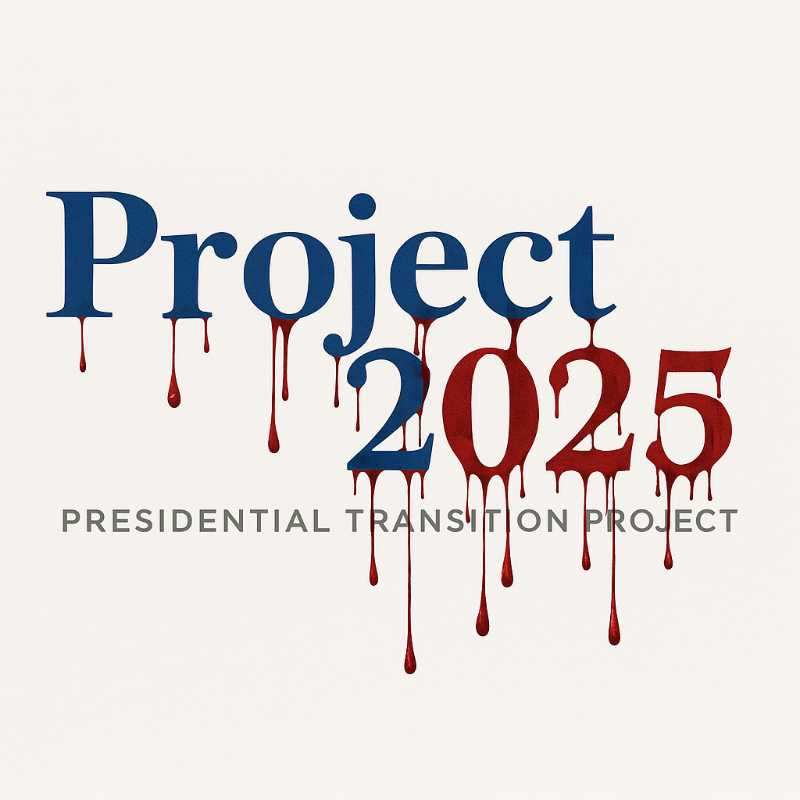
The roadmap the Trump administration is following, though Trump had said on the campaign trail he didn't know anything about it. Quite the contrary. The following are the things to worry about... deeply.
Project 2025 is a comprehensive plan developed by conservative organizations, notably the Heritage Foundation, aiming to reshape the federal government according to a specific ideological agenda.
Read 1 more arguments
While proponents argue it seeks to streamline governance and reinforce certain values, critics warn of significant dangers to American democracy and public welfare.
-
Erosion of Democratic Institutions
- Consolidation of Power The plan advocates for expanding presidential authority, potentially undermining the separation of powers and leading to executive overreach. This centralization could diminish the checks and balances fundamental to U.S. democracy.
- Civil Service Overhaul By proposing the replacement of nonpartisan civil servants with political appointees, Project 2025 risks politicizing essential government functions, compromising the impartiality and effectiveness of federal agencies.
-
Threats to Civil Liberties
- Curtailment of Rights The project includes measures that could restrict freedoms related to speech, assembly, and privacy, aligning with authoritarian practices observed in other nations. Such actions may infringe upon individual rights and suppress dissent.
-
Impact on Public Services
- Education Proposals to dismantle the Department of Education could lead to reduced federal oversight and funding, exacerbating educational disparities and hindering access to quality education for all students.
- Environmental Protections Rolling back environmental regulations threatens efforts to combat climate change and protect public health, potentially resulting in increased pollution and associated health risks.
- Public Health Restructuring agencies like the CDC and FDA may delay emergency responses and compromise the approval process for essential medications, endangering public health infrastructure.
-
Voter Suppression and Election Integrity
- Electoral Manipulation The plan’s strategies could undermine the integrity of elections by introducing measures that suppress voter turnout and erode public trust in democratic processes.
📖Project 2025
Project 2025 poses a significant threat to the foundational principles of American democracy. By concentrating power, undermining civil liberties, dismantling public services, and compromising election integrity, the plan could lead the United States toward authoritarianism, jeopardizing the rights and well-being of its citizens.

Foreign aid across the globe has staved off starvation, thirst, war refugee sanctuary, conflict resolution, medical help to end outbreaks including Ebola and Mpox. It is crucial not only for compassionate and humanitarian reasons, but helps entire cultures with gratitude toward the US for being there in time of need.
Dismantling the United States Agency for International Development (USAID) poses significant risks to global humanitarian efforts, U.S. foreign policy, and national security.
-
Humanitarian Impact
- Loss of Essential Services USAID provides critical support in health, education, and disaster relief worldwide. Its elimination could lead to increased malnutrition, untreated diseases, and higher mortality rates in vulnerable regions.
-
National Security Concerns
- Increased Instability By addressing root causes of conflict, such as poverty and lack of education, USAID contributes to global stability. Its absence may lead to heightened unrest, creating environments conducive to extremism.
-
Economic Ramifications
- Impact on Global Markets USAID’s development programs help build emerging markets for U.S. goods. Dismantling the agency could reduce trade opportunities and harm the U.S. economy.
-
Geopolitical Consequences
- Loss of Influence Without USAID, other nations, particularly strategic competitors like China and Russia, may fill the void, expanding their influence through alternative aid programs.
🛟USAID
Eliminating USAID could have far-reaching negative effects, undermining humanitarian efforts, compromising national security, weakening the U.S. economy, and diminishing America’s global standing.
Read 1 more
Maintaining a robust foreign aid agency is crucial for promoting global stability, economic growth, and the advancement of democratic values.

June 14



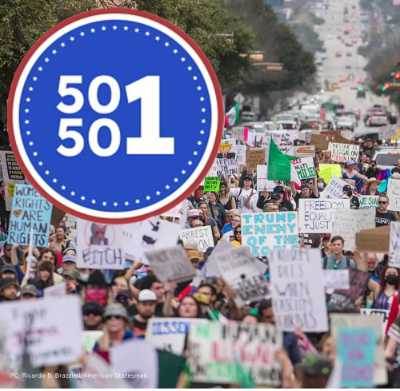
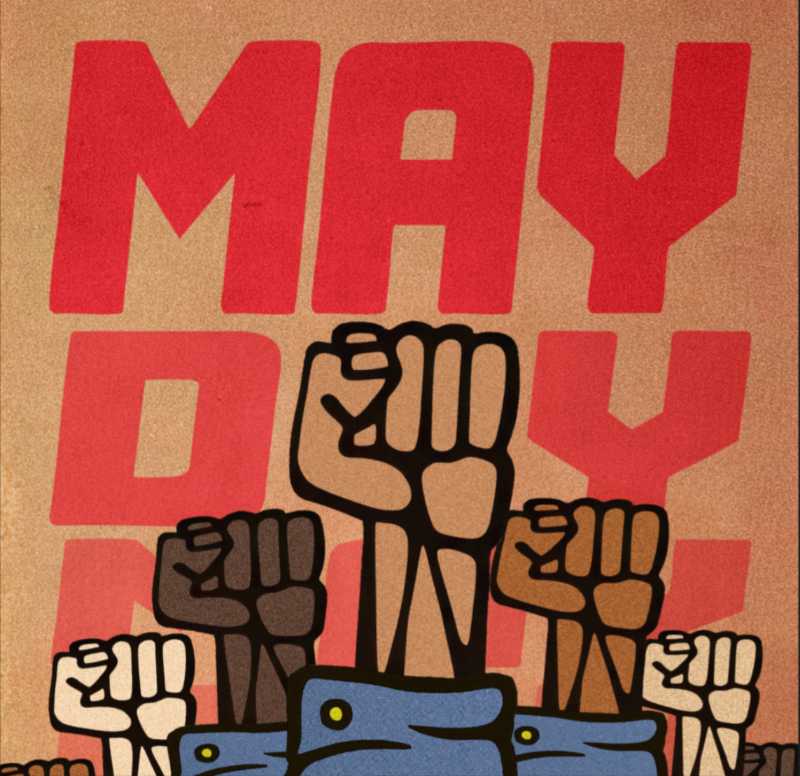
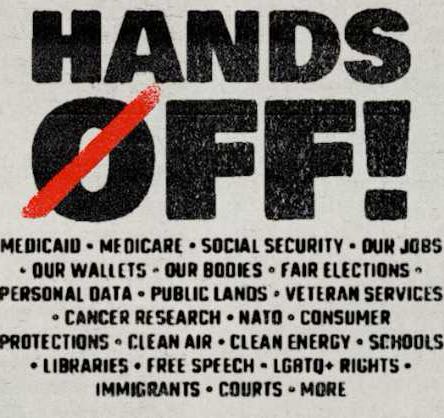
🥰Self Care

Taking care of ourselves in this time of extreme uncertaintly is more important than ever. This website is not sponsored nor do our links bring in revenue. These are tools we have found to breathe life back into our depleted spirits. You might too.
Guided meditation is easy to follow and helps reset our busy minds and bring peace to our souls.
⚖️ Balance ☯️
The award-winning Apple & Google App of the Year, BALANCE is free for one year. Can't recommend more highly. (Not a monetized link.)
🧘♀️ Yoga Nidra 🧎♀️
Yoga Nidra is a meditation form that has a powerful ability to calm our spirits and get us in touch with our deep inner selves. This link is to a search of YouTube creators that host from 10 to 60 minute guided sessions. Finding peace could be your new addiction.
🪇 Sound Baths 🪈
Sound baths can take a number of forms and may include a wide array of percussive instruments to be heard while in a relaxed, meditative or even a sleep state. Sleep Vibrations is one of our favorites as it comes with not only sounds but a very relaxed cat.
Prayer
Dove of Peace
Place of Worship
Prayer Hands
Meditation
Om
Christian Cross
Crescent & Star
Star of David
Dharma Wheel
Spiritual Atom
Torii Gate
Energy Flow
Across time and geography, human beings have lifted their voices, hearts, and hopes to higher powers—seeking mercy, strength, healing, and peace. From Yahweh and Allah to Krishna and Avalokiteshvara, the divine takes many names and faces.
Creator or Great Spirit (Wakan Tanka among the Lakota, or Gitche Manitou to the Algonquins), Amaterasu in Japan, Odin in Norse traditions, Pachamama in the Andes, and Nzambi in Central Africa—each represents a doorway to something larger than the self.
Whether one prays to Jesus, Buddha, the Orisha Obatala, the Hawaiian Akua, or the goddess Isis, the act of spiritual connection itself carries proven benefits.
Studies have shown that contemplative prayer or meditation can reduce stress, lower blood pressure, regulate emotions, and even bolster the immune system. More deeply, it offers a sense of meaning, belonging, and inner alignment—a healing that transcends language and doctrine.
🍴 Food Fasting 🍽️
Fasting can take many forms that strengthens our spirit, resolve, bodies and minds. The most well known form of fasting is fasting from food. Tremendous health benefits come from a fast, whether you choose to contain your consumption within an 8 hour window several days a week, or to go without food for 15, 20, 40 or even 120 hours (5 days).
On top of health benefits for your body, fasting triggers a process called autophagy, in which your body cleans out damaged cells and regenerates new, healthier ones. This not only helps with detoxification but may also reduce the risk of chronic diseases like cancer and neurodegeneration.
Fasting has also been shown to improve insulin sensitivity, allowing the body to regulate blood sugar more efficiently and potentially preventing type 2 diabetes.
🖥️ Computer & Device Fasting📱
Fasting from computers and digital devices—often called a “digital detox”—can offer profound benefits for mental health, focus, and overall well-being. Constant connectivity and screen exposure can lead to cognitive overload, disrupted sleep patterns (especially from blue light), and even symptoms of anxiety or burnout.
Taking intentional breaks from screens allows the brain to rest, helps reset attention spans, and encourages more mindful, present-moment living. It also opens up time for physical activity, face-to-face interactions, creative pursuits, and reflection—things often displaced by endless scrolling and notifications.
Just like fasting from food, stepping back from devices can recalibrate your habits and foster a healthier, more intentional relationship with technology.
📺 News Fasting 👩🏽💻
For those of us who want to be in the know and on top of what is going on up-to-the-minute, a fast from news feeds and social media posts ("doom scrolling") is a near-requirement for optimal mental health
Fasting from the news or social media can be a powerful act of self-preservation in an age of information overload. Constant exposure to breaking headlines, outrage cycles, and algorithm-driven feeds can heighten stress, distort perspective, and erode mental clarity.
Taking a break allows the nervous system to reset, reduces reactive thinking, and creates space for deeper reflection and emotional balance. It also helps reclaim attention, shifting focus from the external noise of the world to internal values and priorities.
Whether it’s a few days or a few weeks, stepping away from the news or social media can foster greater calm, intentionality, and a renewed sense of agency over what—and who—gets your attention.
🚶♂️ Walking, Strolling, 🏃♂️ Wheeling👨🦽
Get out of the house, the apartment, the condo, the tent, the car, wherever you spend much of your time: change it. Sitting is not the best things for our bodies that were built to move. Whether that means using an assistive mobility device, or just strapping on some shoes, we need to do this for ourselves near-daily.
Fresh air, sunshine, hearing nature like birds or the wind in the trees is a tonic for our souls. Walking, jobbing, running, stolling, power-walking, cycling, group sports: all have significant benefits that can help change our perspectives on the spot in real-time.
🧘🏼♂️ Stetching 🙆♀️
Daily practices like easy stretching or easy to intense forms of yoga or pilates keep our bodies in excellent health and reactive to any unexpected thing that comes our way. Beginners can find apps or content-channels that help guide you into the forms and shapes that make up the yoga body.
Attending a nearby yoga studio can help with learning and growing with the techniques that will keep your body young no matter your physical age.
⚽️ Cardio-Vascular 🚵♀️
Pumping our heartrates up using a formula for maximum heart health and benefit several times a week extends our lives, brings nutrietnts like oxygen to every part of our bodies including out brains and keeps us young.
Some people like to do it daily or near-daily, but a "weekend warrior" approach of exercising at a high heart rate for 20-40 minutes twice a week has similar benefits. Trying a variety of approaches, including HIIT interval training floods our systems with pleasing and calming endorphins that help clean our body of oxidation.
Healthy approaches
🍌 🫐 🌾 🥦 🍉 🥑 🥜 🍊 🍒
Such as Mediterranean-type diets or a much-reduced animal product diet that teems with delicious whole grains, nuts, berries and fruit, vegetables-especially dark leafy greens-can flood our bodies and minds with deep anthrocyanin antioxidants, clearing our blood of free-radicals that harm our cells and lead to unchecked canerous growth, and power our bodies and minds for the perplexing situations ahead.
As we all hear repeatedly, highly- and ultra-processed foods should be avoided. Packaged snack cakes and cookies, sodas, anything with high fructose corn syrup, a long list of chemical-sounding additives and colors, trans-fats and high amounts of saturated-fats are not good.
The latest nutrtional suggestions emphasize added sodium/salt as a the new #1 food not to consume in anything more than weekly minimum amounts. We need the iodine in salt or seaweed, but larger amounts found in processed and restaurant foods can contribute to fatality due to the fast and high rise in blood pressure that can dislodge plaques formed in the endothelial lining of our veins and arteries that lead to heart attacks and strokes.

🌳 Touch 🌼

- 🐶Spend time with an animal on your lap🐈, looking up at the stars 🌠, going for a walk around the park 🌲 Perhaps a few minutes... or more... on a slide 🛝 or a swing.
- Get outside the city for a few hours. Have a "go to" spot that is familar and comforting: prehaps by a river or creek, amongst a thicket of trees, along the shores of a lake or ocean. 🏖️
- If you live in an urban area, a simple walk around the block 🏨 is wonderfully restorative, whether in cold ☃️, pleasant ⛅️ or warm weather ☀️. Get to know the flora on your block. What's the name of that flower that smells so good? Is there a cat, dog, squirrel or mourning dove couple that you get to kmow?
- 🌲Make friends with a tree and say hi: touch it, pat it on the back and/or hug it at least once a week. Has she told you her name?
🧠 Brain games 🧐
Whether using award winning apps like 🧩 Elevate 🤔 every day, or the New York Times popular free games like Wordle, or turning the screen off and working on rubic's cubes and other puzzles like crosswords, searches and sodoku, these challenging games not only provide exercise for the mind, they also help us get away from reading and reacting to news.
Budgeting a time of day for these adventures and sticking to it cane be one of the healthiest things we do for ourselves.
More than just company, friends keep us alive.

Research is clear: having close, meaningful relationships boosts longevity, strengthens the immune system, and protects against depression, anxiety, and even cognitive decline.
A meta-analysis of 148 studies found that people with strong social connections had a 50% increased chance of survival, regardless of age, gender, or health status. (Holt-Lunstad et al., PLOS Medicine, 2010)
- Chronic loneliness is now recognized as a greater health risk than obesity or smoking 15 cigarettes a day, increasing the risk of death by up to 26%. (Cacioppo & Cacioppo, Perspectives on Psychological Science, 2014)
- Social interaction helps regulate stress hormones like cortisol, keeping inflammation down and the body in better balance.
- People with close friendships are less likely to develop dementia and age-related memory decline. (Fratiglioni et al., The Lancet Neurology, 2004)
Friends aren’t a luxury. They’re not just emotional support. They’re biological fuel—protecting heart health, brain function, and even gene expression. And it’s never too late: even forming one new connection later in life shows measurable health improvements.
Self Care in Practice

- Reach out: send a text, make a call, ask someone on a walk or hike.
- Join up: read with a book group, make a sign for a protest, sing in a choir.
- Make space to have a friend in your life for the joy, the vulnerability to experience and the fun of friehdship.
- Find a new connection or call up a friend from the past.
Social Media
Social media can be a powerful tool for friendship. It bridges distance, reconnects long-lost relationships, and sustains communities across time zones and life changes. For people with mobility limits, chronic illness, or caregiving responsibilities, it can be a lifeline. Support groups, shared interests, and simple check-ins can turn screens into sources of real comfort and continuity.
But the same platforms that foster connection can also distort it. Social media encourages curated lives and passive scrolling, which can leave users feeling more isolated, not less. Research shows that comparing ourselves to others online—especially when lonely—can deepen loneliness. And online interactions can’t always replace the warmth of face-to-face presence or voice.
The key is intention. Using social media to interact, not just observe, can tip the balance toward belonging. Friendships thrive when we reach out, not just react.
Self Care in Practice: Healthy Social Media Habits
- Set intentional time windows. Avoid all-day ambient checking. Designate specific times—like 15 minutes in the morning and evening—to check in with friends or groups.
- Use a timer or app limits. Tools like iOS Screen Time or Android’s Digital Wellbeing can help cap daily use. Studies show that limiting social media to 30 minutes a day can significantly reduce anxiety and depression.
- Prioritize connection over consumption. Use social apps to comment, message, and interact—not just scroll. Passive use is linked to loneliness; active engagement is not.
- Curate your feed. Unfollow accounts that spark comparison, anger, or fatigue. Follow those who uplift, educate, or genuinely matter to you.
-
Protect your peace from trolls.
- Don’t engage. Most trolls thrive on reaction—silence is often the best disarmament.
- Block liberally. Your digital space is yours.
- Report abuse. Platforms won’t improve unless users hold them accountable.
- Step back when needed. Take breaks after exposure to hate or harassment—it can affect stress hormones and mood regulation.

Bottom Line
Friendship isn’t just good for the soul, it’s required maintenance for a healthy body and mind.
Hugging isn’t just a sweet social gesture—it’s a potent health booster.
Research over the past decade has confirmed multiple psychological and physiological benefits of hugging, especially when hugs last longer than a fleeting second. Here’s a breakdown of the benefits and recent findings:
Top Benefits of Hugging
- Reduces Stress & Cortisol Levels
- A 2018 study in PLOS ONE found that people who received hugs during interpersonal conflict experienced less intense negative feelings and lower stress levels.
- Hugs stimulate the release of oxytocin (“the bonding hormone”), which calms the nervous system and reduces the stress hormone cortisol.
- Lowers Blood Pressure & Heart Rate
- A 2005 study from the University of North Carolina showed that people who hugged their partners before a stressful task had lower blood pressure and heart rates than those who didn’t.
- Boosts the Immune System
- A study published in Psychological Science (2015) showed that people who received more frequent hugs were less likely to get sick when exposed to a common cold virus—suggesting hugging helps buffer the effects of stress on immunity.
- Improves Mood & Fights Loneliness
- Hugging releases dopamine and serotonin, chemicals tied to happiness and pleasure.
- Regular physical affection is linked to lower levels of depression and anxiety, especially in older adults and those living alone.
- Strengthens Relationships
- Hugging increases feelings of trust, closeness, and empathy, reinforcing bonds in romantic and platonic relationships alike.
How Long Should a Hug Be? Recent studies suggest duration matters:
- Optimal Hug Duration: ~10 Seconds
- A 2022 study in Acta Psychologica tested various hug lengths (1, 5, and 10 seconds) and found 10-second hugs were rated as significantly more pleasant and emotionally impactful than shorter ones.
- Hugs under 5 seconds were perceived as abrupt or awkward unless in very casual interactions.
- No Upper Limit—but Consent Is Key
- While 10 seconds is a sweet spot, longer hugs can offer even more oxytocin release and benefits—if both people are comfortable.
- Unwanted or prolonged hugs, especially in non-intimate relationships, may have the opposite effect.
Researchers have even suggested “prescriptive hugging”:
- Try for 4 to 8 hugs per day, ranging from 5 to 20 seconds, to maximize mental and physical health.
- Hug your friends—longer than 5 seconds, shorter than awkward.
- Oxytocin is the new vitamin C.
- Feeling stressed? Wrap your arms around someone (with permission).

Restoration 😌 Healing ❤️🩹 Rejuvenation 🕊️
During our deep sleep, our bodies don't close down, though they appear so; cells are busy healing bruises, cuts, wounds, internal issues. In fact, it's the only time the body is able to use its resources to heal you.
Sleep is one of the most vital—and underrated—pillars of health. During sleep, the body repairs tissues, consolidates memories, regulates hormones, and clears toxins from the brain through the glymphatic system. Quality sleep strengthens the immune system, improves mood, sharpens cognitive function, and helps regulate metabolism and appetite.
Chronic sleep deprivation, on the other hand, has been linked to heart disease, diabetes, depression, and even shortened lifespan. In short, getting consistent, restorative sleep isn’t just a luxury—it’s essential medicine for the body and mind.
🐝Organizations
These organizations are at the forefront of court challenges to the unnaceptable unilateral decisions made by the current administration.
We are a group of citizens impelled to act. We have no affiliation with the organizations listed other than to donate to them ourselves and support their important work. We hope you consider the same. Even a $5 donation makes a difference.
The American Civil Liberties Union (ACLU) is an American nonprofit civil rights organization founded in 1920.
ACLU provides legal assistance in cases where it considers civil liberties at risk. Legal support from the ACLU can take the form of direct legal representation or preparation of amicus curiae briefs expressing legal arguments when another law firm is already providing representation. In addition to representing persons and organizations in lawsuits, the ACLU lobbies for policy positions established by its board of directors.
Democracy Forward Foundation is a 501(c)(3) nonprofit legal services and public policy research organization in Washington, D.C. Founded in 2017, the organization works to expose and litigate corruption in the Executive Branch of the United States government.
The State of the Union Is up to Us Newsweek, 3.5.25
… is an American non-profit, progressive[2] consumer rights advocacy group, and think tank based in Washington, D.C.
Public Citizen advocates before all three branches of the United States federal government. Its five divisions include Congress Watch; Energy; Global Trade Watch; the Health Research Group; and Public Citizen Litigation Group, a nationally prominent public interest law firm founded by Alan Morrison and known for its Supreme Court and appellate practice.
Since our launch in March 2017, we have obtained and published tens of thousands of documents from federal, state, and local government agencies. Records uncovered by American Oversight have supported congressional inquiries, investigative journalism, and independent actions by partner organizations — and our work has been featured in hundreds of news stories around the country.
WHAT WE DO
We are open records specialists
We act where corruption and government power overlap. From the federal Freedom of Information Act to state transparency laws, we use carefully crafted records requests to extract information from the government — information they often don’t want the public to have. When the government fails to respond as required by law, our team has the legal expertise to take them to court and enforce the public’s right to hold our leaders accountable.
With over 1,000 employees in more than 25 countries across five continents, Project Hope works hand-in-hand with local health workers and health systems to provide urgent relief and transformative solutions that drive lasting impact.
At our core is a shared humanity and compassion that stretches across the work we do. We believe that everyone deserves hope, that health is a fundamental human right, and that together we can strengthen access to care around the world.
In the face of unprecedented challenges, we believe hope has the power to change lives — because we see it every day.
Impeach Trump Again Signature petition to support Al Green's introduction of articles of impeachment as mandated when there is malfeasance on the part of the US President.
Many organizations have filed lawsuits against the current administration. Here are just a few.
- Catholic Charities of Fort Worth This Texas-based nonprofit is suing the administration for withholding $36 million in federal refugee funds, which has led to significant staffing reductions and halted essential services for refugees from countries such as Afghanistan, Cuba, and Ukraine.
- Haitian Americans United and the Venezuelan Association of Massachusetts These immigrant rights organizations have filed a lawsuit challenging the administration’s decision to terminate Temporary Protected Status (TPS) for thousands of Haitian and Venezuelan migrants, arguing that the actions are based on racial prejudice and violate constitutional protections.
- Chicago Women in Trades (CWIT) A nonprofit serving a diverse group of women in skilled trades, CWIT has filed a lawsuit challenging executive orders that severely restrict Diversity, Equity, and Inclusion (DEI) initiatives, asserting that these orders harm their mission and participants.
- National Urban League, National Fair Housing Alliance, and AIDS Foundation of Chicago These civil rights organizations have collectively filed a lawsuit challenging executive orders that ban DEI programs and erase protections for transgender individuals, arguing that these orders infringe upon free speech and due process rights.
- American Federation of Government Employees (AFGE) and American Foreign Service Association These labor unions have sued the administration over mass firings of probationary federal employees, contending that the Office of Personnel Management (OPM) lacked the authority to order such widespread terminations.
- 27 Religious Organizations A coalition including the Mennonite Church, the Episcopal Church, the Union for Reform Judaism, and the Unitarian Universalist Association has filed a lawsuit challenging the administration’s immigration enforcement policies, arguing that these policies violate their religious principles and the rights of immigrants.
🗺️Sources
Online portals and creatives presenting up-to-the-minute details and analysis of value. We have no affiliation with these other than support and interest.
Our Starter Pack includes our go-to content creators
- The Guardian The UK publication has consistent progressive-leaning journalism
- The New Republic Articles with a critical progressive viewpoint
- CSPAN Watch it happen real-time: speeches, votes, arguments, press conferences.
- The Nation Progressive journalism
- Democracy Now! The award-winning 25+ year old "war and peace report" by Amy Goodman and Juan Gonzales
- Mother Jones Are you mad and exhausted? You’re not alone. But we can’t let that paralyze us, because there’s work to be done. One of our most important jobs as journalists right now is shining a light where powerful people want you to see only chaos and darkness. If you want that light to shine brightly, please support our fiercely independent journalism. It can't happen any other way.
- Media Matters Media Matters for America is a web-based, not-for-profit, 501 (c)(3) progressive research and information center dedicated to comprehensively monitoring, analyzing, and correcting conservative misinformation in the U.S. media.
- Common Dreams Progressive independent news aggragate going way back.
- Poltico Decent and fair political analysis.
- NPR News and PBS Newshour Watch and listen while you can. Daily in-depth stories from a cadre of professional journalists.
- The Tennessee Holler on Bluesky Progressive-leaning newspaper from the Deep South. Always Yell the Truth
- Brian Tyler Cohen He watches the Internet so you don't have to. Bright and clever news and analysis.
- Glenn Kirschner Retired Federal Procsecuter in DC with critical cogent analysis
- Erin in the Morning Trans activism news and LGBTQIA+ national updates from ground zero for US citezens under seige.
- 18f Activist federal employees fired from top-rated web development team 18F.
- Senator Bernie Sanders YouTube Warning about oligarchy for 40 years, Senator Sanders is introducing legislation and touring the country to fight for working people.
- Nader Actions to take immediately from the premiere political activist in US history
- Late Night With Seth Meyers Comedian runs down the major political news and somehow is able to elicit smiles amongst the terrible news.
- Trae Crowder, The Liberal Redneck Brilliant progressive comedian from a small town in Tennessee. You will snort.
- The Daily Beast Politics In today's hot poltical clime, TDB doesn't have to resort to as many click-bait headlines and stories as in the past. Truth is stranger than fiction.
- SLATE news and politics When these cats take a deep dive, you become very well informed.
- Fortune Liberal skew on the economy and political news
- The Dean Report Saving American democracy from the GOP's FASCISM one fact (and punchline) at a time! Only the truth--never the corporate media's "both sides" BS!
- The Political Revolution The Sanders created workshop for political change
- Brookings Institute: Politics, Government Bi-Partisan think tank looks at all the angles.
- Michael Moore substack We need you, Michael.
